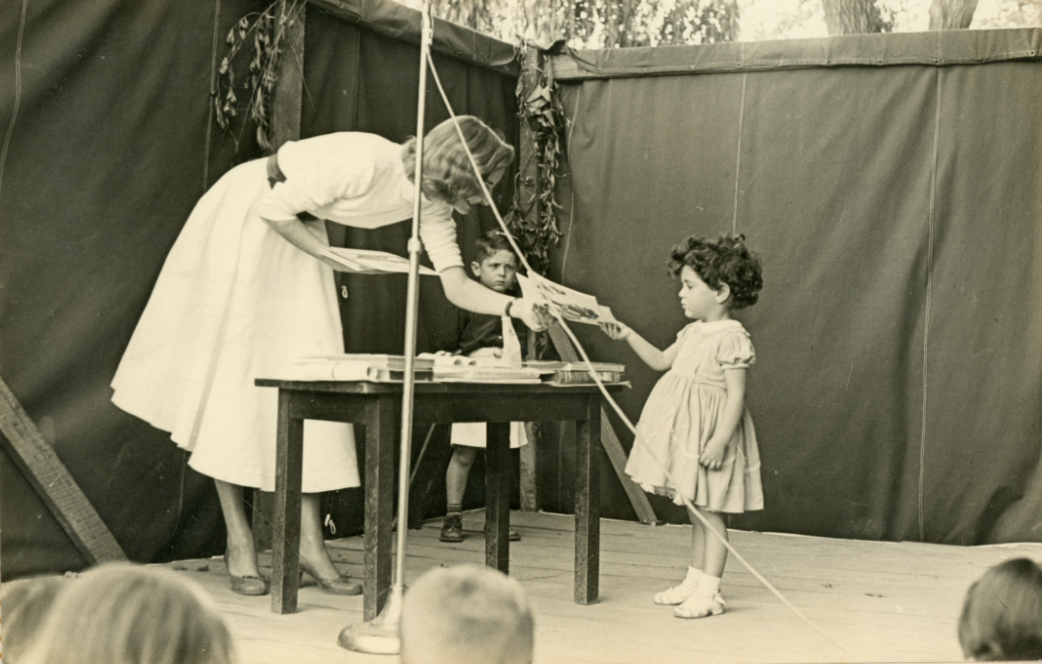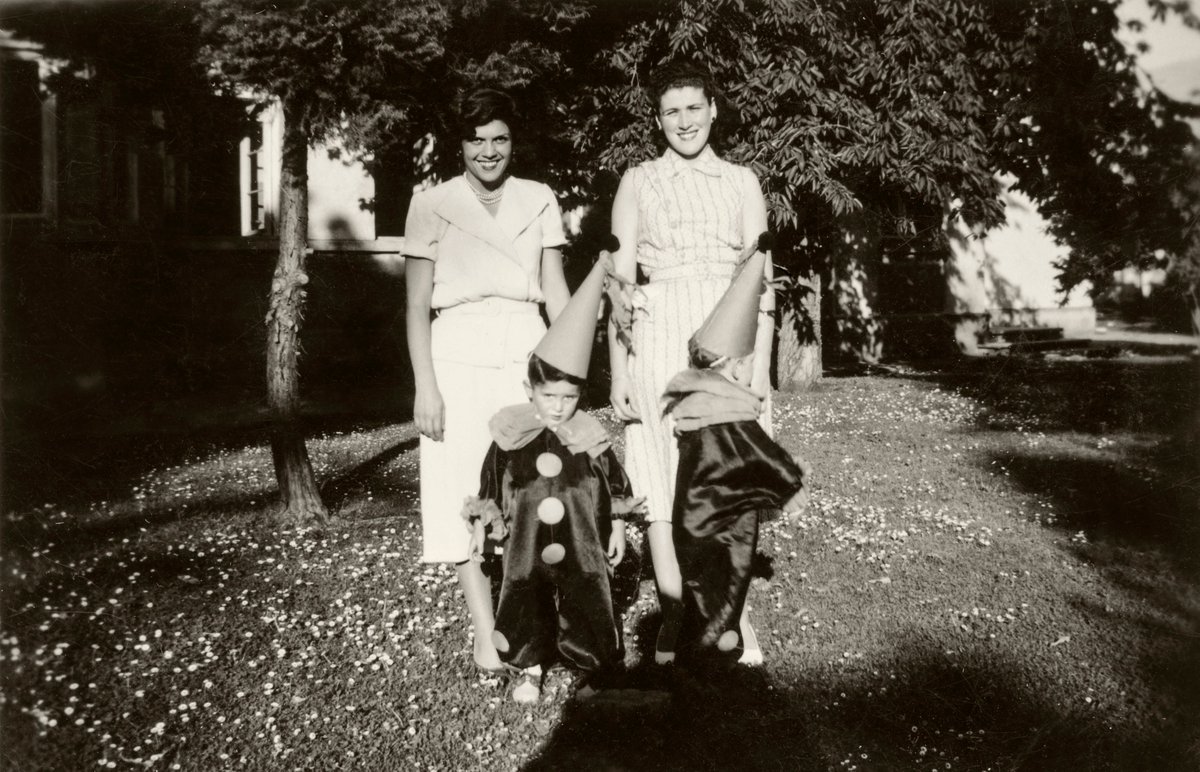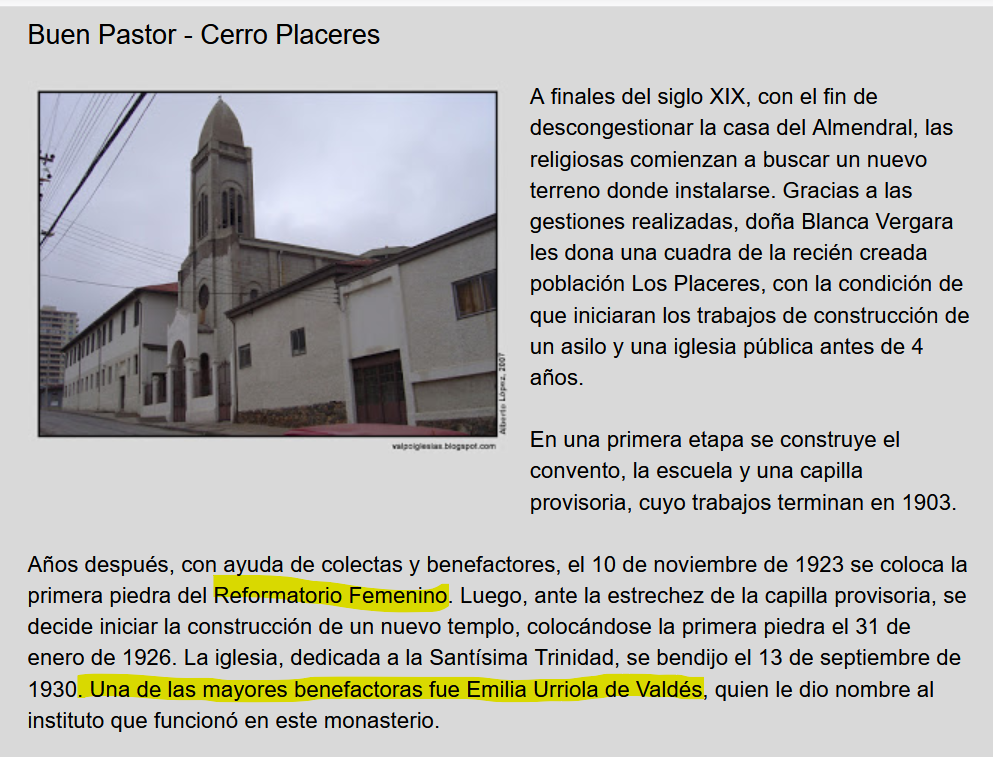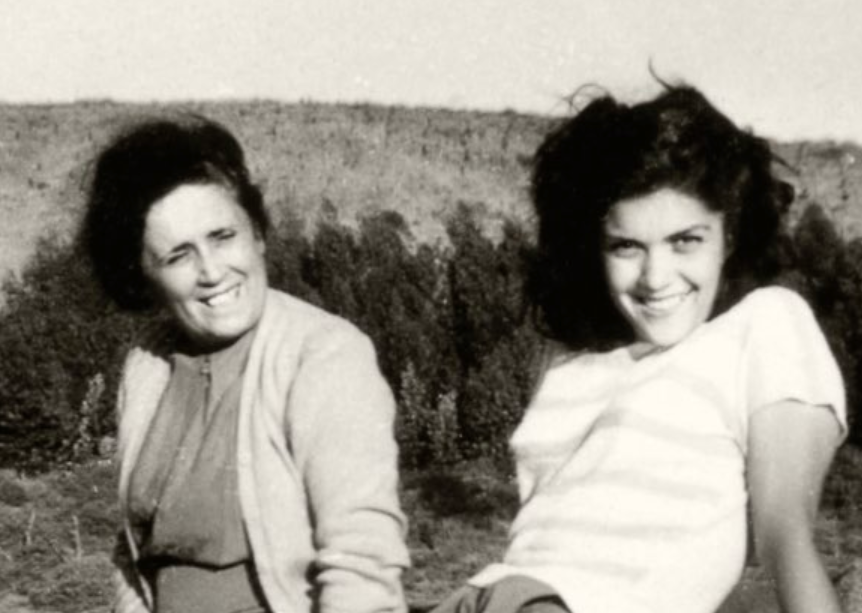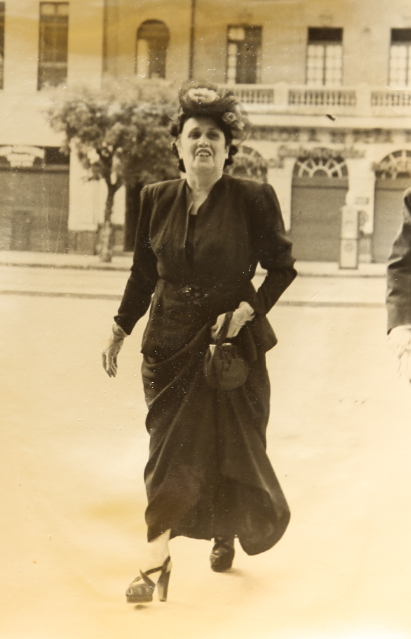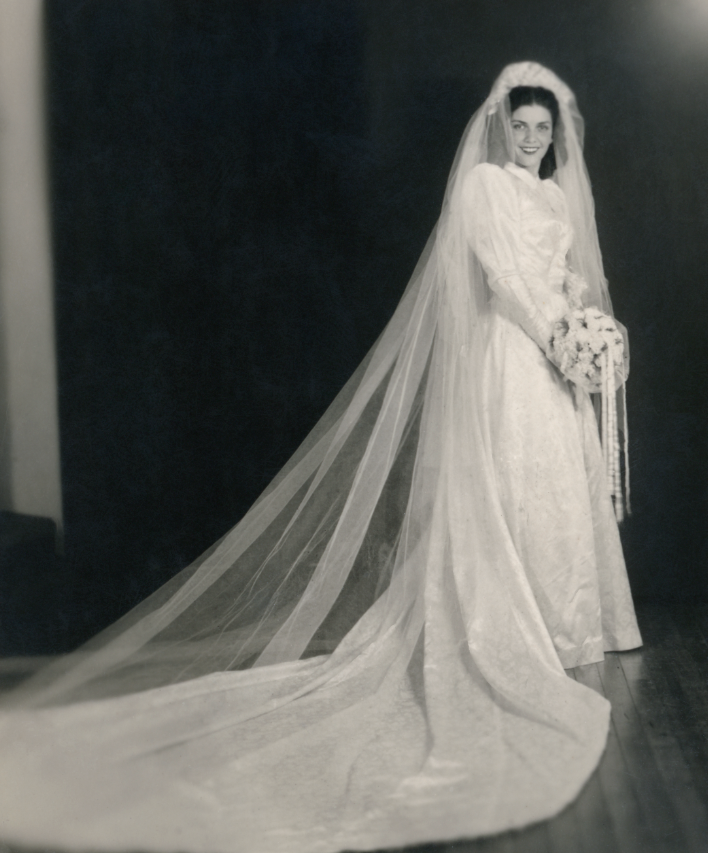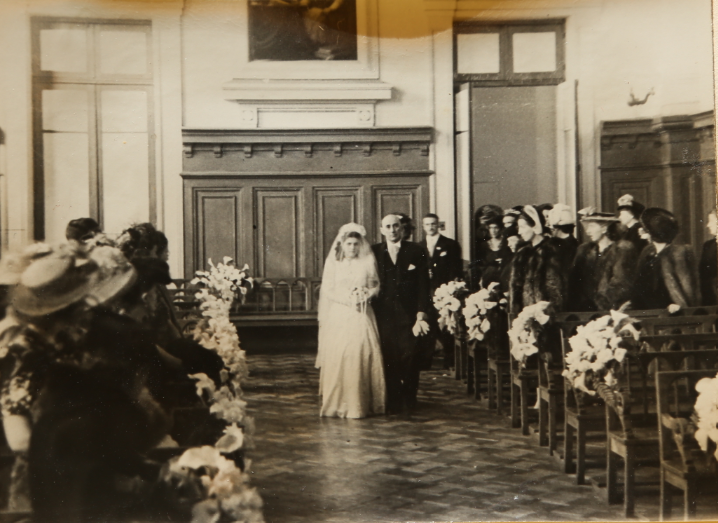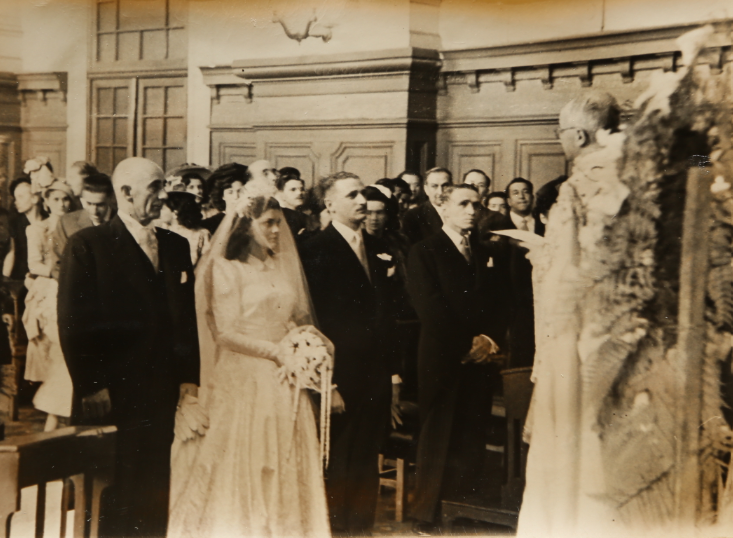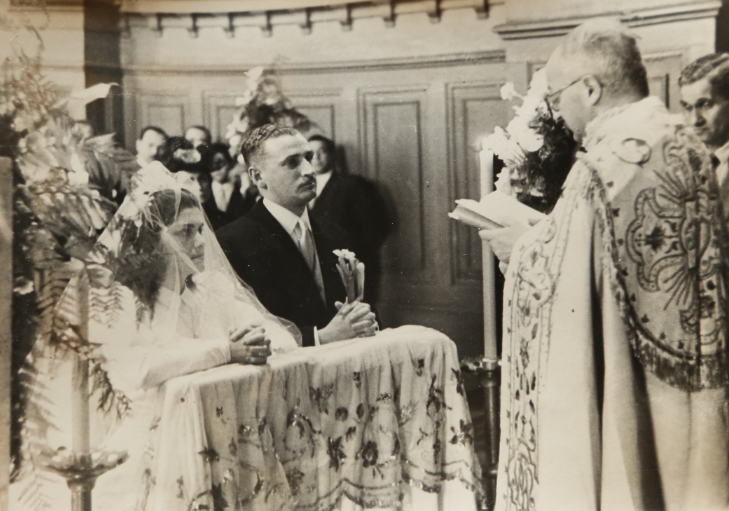I love this photo of my mom as a little kid because she looks so ABSORBED in what she’s doing. She’s *in the moment* with that wheelbarrow, experiencing what some guy later in the century will call a state of flow
Her parents had separated and no one understood why. This being my family, family portraits were still ... happening. And they were weird. It’s crazy that a kid could sense that but you can sort of see it in her face. She says she remembers having these taken.
One day my grandma walked out of her house and left everything—the linens, the furniture, the dishes. She took her two kids and moved back in with her mother.
My grandfather, my grandmother and her mother in happier times, when the former were a’courtin’
My grandfather, my grandmother and her mother in happier times, when the former were a’courtin’
(My grandma was a great ping pong player. The elastic of her underwear snapped while she was mid-match and she held it up with one hand while playing with the other. She won the championship.)
They met in law school, where she was one of just a few women in Chile at that time studying law. Here they are with Iris, my grandma’s lifelong friend. (Iris will become a judge in Viña, bathe daily in the ocean, get face lifts whenever she feels like it and date younger men.)
(I will know Iris only in her black leather pants phase. She’ll be in her seventies with auburn hair and fab red lipstick, her lover always in tow. In a different phase she had fertility problems while living in the country. My great-grandmother, a fussy austere healer, helped.)
Anyway, my grandma (Lala, as I called her) was popular in law school, where the ratio meant men would (for ex) "haze" women by spraying them with cologne. (Yeah.) She was popular generally. Had herself a GRAND OLD TIME, if photos are any indication.
I like photos from this phase and a bit earlier, when Lala was a teen, cuz they& #39;re so drastically different from the GRIM TONE of photos of her childhood (in Cuba, totally isolated on a sugar plantation). Here she is with her siblings and mom back in Chile (one bro hamming it up)
Compare that with the misery here! (Lala& #39;s the one on the far left.) Lala& #39;s mom is in the middle. To her right are her 2 oldest daughters (resenting how much they have to do cuz my great-grandmother liked writing in bed). To her left is a mysterious spinster aunt who died in Cuba
(The mysterious spinster aunt had a trousseau she brought with her. She was engaged and called it off. No one knew why. She never married. Instead, she weirdly dedicated her life to my great-grandmother--and NOT AT ALL to any of her other nieces. One theory: SHE WAS HER MOTHER)
I don& #39;t *really* buy this I don& #39;t think? But I also don& #39;t understand even a little bit why an aunt would leave the whole world she knew and understood to follow a curmudgeonly intellectual niece to an isolated sugar plantation in Cuba! To take care of her 7 children! Alone!
Lala& #39;s older 2 sisters, the glum teens above, were HILARIOUS--they& #39;d steal a chicken, pluck it and roast it INSIDE A WARDROBE and gobble it up. But they had no fond memories of this aunt. Their main memory is of her asking them to go see "if your beloved mother NEEDS anything?"
More evidence: my great-grandmother (Elisa Sr.) was--thanks to Mysterious Aunt--fed a different DIET than her other sisters--one of whom developed Rickets from malnutrition. :( And was educated differently--all 4 sisters were brilliant but only she got a doctorate in philosophy.
Here are the other sisters. (Doesn& #39;t this make Cuba look like a BLAST? I don& #39;t know why everyone looks depressed in the Cuba phase.)
They were wonderful women really. Florinda was a math teacher and tutored my mother, Raquel was an opera singer. Estela taught domestic arts and her dinners were legendary--she& #39;d decorate the table with tiny sculptures made out of bread "miga" and sing a song mocking each guest.
I& #39;m sorry to report, however, that my ill-mannered mother would start choking with suppressed laughter any time Tia Raquel started singing opera--infecting her cousin Gemi until they both exploded in laughter and were expelled from the concert room.
(Tia Raquel generously offered me her *wondrous* personal collection of La Abeja Maya comics when I was 4. MY FAVORITE! Alas, she looked very like what I had learned a witch was. "Deme un besito," she said, the script from every story. I learned then that yes, I& #39;d die for comics)
In hindsight, I see that these 3 sisters had it all figured out: maybe they weren& #39;t the favorite, like Elisa, but they lived together in a tidy house, kept the larder stocked with candy, the shelves stocked with comics, opera, and math books, and threw great parties.
Until, that is, their big sister, the annoying fave, left Cuba in a rush and landed on them--with her SEVEN CHILDREN IN TOW. Here is what I believe is the passport photo for their departure, featuring Lala presiding in a motherly way over her younger brothers.
Tia Quela (the younger of the 2 sullen teens) wrote that during an uprising related to Machado& #39;s election, the army took their horses and used the house as their headquarters, while rebels were stationed on the other side of the plantation. They fled. Their dad, David, stayed.
(David--a debonair shepherd from Asturias, Spain--never came back to Chile, where he& #39;d met and wooed Elisa. They never met again. He supported her from afar, sending $ until Castro took over. And started a second family in Cuba, so Elisa Sr& #39;s seven kids have 7 Cuban siblings.)
The 3 aunties handled the invasion of their small home with a LOT of grace. They turned their salon into a dormitory with cots for Lala and her siblings And when the youngest, Jaime, took to spitting in random places, or smoking (!) behind doorways, they *tried* to discipline him
They& #39;d make all the kids line up in the yard whenever they found a loogie.
"Lala, where do you spit?" they& #39;d ask. "In the toilet!" Lala would say.
"Elisa, where do you spit?" "In the toilet," she& #39;d groan. "Jaime, where do you spit?" they asked (he was 3).
Jaime: "ON THE FLOOR"
"Lala, where do you spit?" they& #39;d ask. "In the toilet!" Lala would say.
"Elisa, where do you spit?" "In the toilet," she& #39;d groan. "Jaime, where do you spit?" they asked (he was 3).
Jaime: "ON THE FLOOR"
Elisa Sr. smelled smoke and saw Jaime& #39;s baby feet under the kitchen door. Swung it open and there he was (still 3) puffing, improbably, on a cigarette.
"JAIME," she said, "WHAT ARE YOU DOING?"
"Schumando," he said casually. (Fumando: smoking.)
The 3 tias were saints, man.
"JAIME," she said, "WHAT ARE YOU DOING?"
"Schumando," he said casually. (Fumando: smoking.)
The 3 tias were saints, man.
ANYWAY: the point is, Lala& #39;d gone through a fair bit by the time she was in law school, and I& #39;ve thought about it a lot as I& #39;ve tried to figure out why she chose my grandfather out of all the dudes competing for her favor. (And why it went so wrong.)
(Here& #39;s a photo of Lala& #39;s mom and dad, Elisa Sr. and David, shortly before they went to Cuba. I don& #39;t know why it& #39;s cut/torn. Well, I have some theories--one has to do with Elisa Jr. there on the right, their eldest. But I& #39;m choosing at present not to think too hard about it.)
I never met my grandfather. He died shortly after I was born. He was a pretty but peculiar-looking child--pale and haunted like a Victorian ghost.
I had a weird moment when I saw this photo of him--not just because the first version of it I saw was this creepy negative, but because I felt sure I& #39;d seen it before
And then I realized why. Here is his son, my mother& #39;s brother. He is named Fernando, just like his father, and is also a small sad clown, as his parents have just split up.
(My family produces lots of redundancies--there are 3 Fernandos. I am the 3rd Liliana. etc.)
(My family produces lots of redundancies--there are 3 Fernandos. I am the 3rd Liliana. etc.)
And that& #39;s for a very good reason: his mother, my great-grandmother Filomena, is locked in an insane asylum shortly after his younger sister is born. For the rest of her life.
I have scoured my relatives& #39; albums for photos of her. She has sad, wonderful eyebrows.
This might be the only photo of him I& #39;ve seen with both his parents. She looks truly happy with babies in her arms in some of these photos, but this one is strikingly dour. No one looks happy to be at the beach.
This is her husband, Valentin, who had her committed.
This is her husband, Valentin, who had her committed.
(Here, just to shake things up, is a happier triumvirate: my mom and Lala took me to Disneyland! which I guess struck me as a great place to read a not-especially-light-or-portable book? Extremely grateful the other 2 Lilianas put up with my shit tbh.)
Noting with interest how much I don& #39;t want to talk about this part. I started posting to this thread because I& #39;ve been stuck and I figured it might be fun to just stick some pictures up
The thing is, I don& #39;t really quite know what happened to Filomena, and I& #39;m not sure I want to
The thing is, I don& #39;t really quite know what happened to Filomena, and I& #39;m not sure I want to
Her family was rich. To be blunt: It& #39;s more than possible that Valentin married her for her money and then got her out of the way.
That& #39;s the worst case, but there& #39;s more. Like: she was locked up shortly after she gave birth to a daughter, Ines. But the kids at least visited her
That& #39;s the worst case, but there& #39;s more. Like: she was locked up shortly after she gave birth to a daughter, Ines. But the kids at least visited her
Then at some point--when Ines was 12 or 13--she was told her mother died.
She hadn& #39;t.
And her brother--my grandfather--knew it.
And he kept his sister in the dark.
She hadn& #39;t.
And her brother--my grandfather--knew it.
And he kept his sister in the dark.
I don& #39;t understand why. Can& #39;t imagine what that was like for Filomena--for her daughter to suddenly stop visiting her.
Ines is in her 90s. I& #39;ve been postponing a phone conversation with her about this. When her son (my uncle) didn& #39;t pick the phone up 2 weeks ago, I felt relief.
Ines is in her 90s. I& #39;ve been postponing a phone conversation with her about this. When her son (my uncle) didn& #39;t pick the phone up 2 weeks ago, I felt relief.
(oh I guess this is where I should say please feel free to mute or unfollow if you& #39;re bored or find threads tiresome--I don& #39;t know what I& #39;m doing here but I don& #39;t think I& #39;m stopping for awhile yet)
This is Inés. My grandfather Fernando& #39;s sister. Who was told--by her father, her brother, and her aunt Beatriz (who acted as a kind of maternal figure) that her mother had died a few years ago. At the time this photo was taken, I think she still thought her mom was dead.
!! I was looking for a photo of Beatriz but found another photo of Filomena. I like how broad and serious she looks here--like a detective on the case. The fur the lady behind her is wearing is quite a thing.
argh found another--dated February 23, 1916. Filomena& #39;s face is creased out, but interesting to see her in happier times. And what rich Chilean society dressed like. Teeny tiny bag, absolutely ENORMOUS muff!
(going through my grandfather Fernando& #39;s photo stash currently)
(going through my grandfather Fernando& #39;s photo stash currently)
I give up. Only photo I can find rn of Beatriz, Fernando and Ines’ mother figure (sister of Valentin, who married Filomena and had her commmitted) is this one. She’s chaperoning Fernando and my grandma on a date! Fernando’s obviously behind the camera and Lala is GLOWIN’
A relevant consideration re: my grandma and her siblings is that they were home-schooled by Elisa Sr. in Cuba. They were taught WELL--most tested into higher grades than their ages warranted when they came back. But many of the books they read were *extremely* romantic.
Lala was a romantic TO HER CORE. So I can imagine that my grandfather& #39;s tragic back story would have appealed to her. So would the fact that he bore it nobly. And that he, too, was a romantic. They fell hard for each other, but I think they were EXTREMELY into being in love.
It was really strange to finally see these--I& #39;d known about them forever. Lala kept all of them in her closet, neatly stacked in a box, all through her second marriage. She showed them to me once. She would read them sometimes, I think, just trying to figure out what happened.
(I used to think this was pure romantic nostalgia, but I& #39;m not sure now. They were proof, I think--proof she needed--that she hadn& #39;t made it up. They really *had* been this way once--he& #39;d written her constantly, almost every day sometimes, even after they& #39;d seen each other.)
It& #39;s a dangerous thing to have only one half of a love correspondence. He does not appear to have kept hers. (Or if he did, his son destroyed them.)
The letters are beautiful in the way that some love poems are beautiful. They& #39;re also sappy in the way love poems are sappy.
The letters are beautiful in the way that some love poems are beautiful. They& #39;re also sappy in the way love poems are sappy.
"Pura mermelada," my mom said when I read her part of one.
Some of his responses allude to fights they& #39;ve had which, to my ear, sound as silly as fights between people in love often are. Over who loves who the most. How dare she, in her latest, suggest that he could not feel for her what she does for him. Has she changed her mind? Etc.
But the more telling ones reveal something about how he thinks about happiness--and her good cheer in particular. Here& #39;s a sample excerpt I translated; it& #39;s just shot through w/what he describes as infectious, proleptic, adoring, not particularly healthy nostalgia.
It& #39;s not the kind of problem they seem to have when they& #39;re together. He looks relatively happy and urbane here, in white, with her brothers! (I envy the pockets on this dress of hers.)
Here they are, posing cheerfully with Lala& #39;s nephew. During the years of their courtship (which may have been five?), he& #39;s writing her (sometimes nightly!) letters. It& #39;s a lot! It& #39;s probably, tbh, obsessive.
Things are sufficiently serious that he *takes her to meet his mother*.
I wish I remembered more of what Lala said about this meeting. I vaguely recall her describing Filomena as a quiet lady. Kind. I wish I& #39;d known to ask more questions.
I wish I remembered more of what Lala said about this meeting. I vaguely recall her describing Filomena as a quiet lady. Kind. I wish I& #39;d known to ask more questions.
(wow I& #39;m going through these teeny tiny photos and trying to zoom in and see what& #39;s in them and restore them to the best of my ability and holy cow, there are some really lovely ones of Filomena on the beach with my grandpa as a little boy, pre-everything)
Anyway. As you& #39;ll recall: Filomena was institutionalized. But she got to see her kids occasionally. They& #39;d visit and it looks like she could leave to go on walks with them. (Supervised, I assume.) Here she is with tiny little Ines.
Here she is with both of them, and it& #39;s touching to me how overjoyed Fernando looks. Her face too, of course.
And the years crept by and the kids kept growing, the way kids do. I love how cheerful and insouciant Ines is in this one--she reminds me just a tiny bit of my mom. Filomena looks just heartbroken. Or lost? I don& #39;t know.
She wrote them: "My beloved and remembered son:
You can’t imagine the pleasure I took in your simple card; I see from it that happily, you arrived without news [difficulties]. I’m so glad you enjoyed the powdered cakes. Write to me soon. Your mother hugs you and kisses you."
You can’t imagine the pleasure I took in your simple card; I see from it that happily, you arrived without news [difficulties]. I’m so glad you enjoyed the powdered cakes. Write to me soon. Your mother hugs you and kisses you."
Shortly after that last photo was taken, Ines was told her mother died.
(Here she is with her son, my Tio Gerald.)
(Here she is with her son, my Tio Gerald.)
I never really knew Ines, so I& #39;m really glad I got to talk to her two years ago for the first time and get at least some of her perspective on all this.
"You know how I found out my mother was alive?" she said to me. "Your grandmother. She was the one who told me."
"You know how I found out my mother was alive?" she said to me. "Your grandmother. She was the one who told me."
Such was my shock--first at realizing that Lala had met Filomena *while Ines was in total ignorance of the fact that her mother was alive* (WHAT), THEN at the fact that Lala apparently broke a family-wide conspiracy of silence--that I& #39;m foggy on what she said next.
After she found out, either her brother (my grandfather) threatened to run her over with his car if she ever visited their mother--or that he actually *did* somehow hit her with his car when she did? I hate that I don& #39;t recall. (Which is why I need to call her again.)
Imagine discovering (IN YOUR TWENTIES) that a) your mother, who you thought was dead, was ALIVE and you& #39;d missed at least a decade with her and b) your entire family--your father, your brother, your aunt had all lied to you about it!
I can& #39;t begin to calculate the damage
I can& #39;t begin to calculate the damage
It& #39;s so bad I can& #39;t actually absorb the part about the threat (or attack?) from her brother. To continue keeping her away! From the mother she was parted from when she was an infant! It& #39;s TOO MUCH. COME ON.
okay, here& #39;s another thing that& #39;s good. remember the second of the father-and-son set of small sad clowns? the one on the right here? https://twitter.com/Millicentsomer/status/1288608760181612544">https://twitter.com/Millicent...
I cropped that photo to see his face better. Well, I just saw *another* little boy dressed as a clown and thought to myself "HUH. was this just the Crayon costume of the 1940s?" And I mean it probably was, but I just realized the newest clown was my Tio Gerald, Ines& #39; son.
So I went back to the uncropped image and it& #39;s of Lala and Ines with their boys dressed identically.
I think Lala& #39;s marriage had failed at this point. (Ines& #39; will fail too.) But given what Lala did for Ines, it& #39;s nice to have this image of the 2 of them with their tiny boys.
I think Lala& #39;s marriage had failed at this point. (Ines& #39; will fail too.) But given what Lala did for Ines, it& #39;s nice to have this image of the 2 of them with their tiny boys.
I’m realizing, looking again at this photo, that Filomena is actually walking with tiny Inés, who is dressed in white and looks like a little ghost or a splotch on the pavement. I noticed the fur of the lady behind her and missed her https://twitter.com/millicentsomer/status/1288888907405254656?s=21">https://twitter.com/millicent... https://twitter.com/millicentsomer/status/1288888907405254656">https://twitter.com/millicent...
Whew. I talked with Ines, now 92 and stuck in quarantine in Chile. I had some stuff wrong.
a) As I& #39;d understood it, Filomena was declared insane when Ines was small. But because F& #39;s family was wealthy, she stayed in a good/permissive institute. (Hence photos of her w/kids.)
a) As I& #39;d understood it, Filomena was declared insane when Ines was small. But because F& #39;s family was wealthy, she stayed in a good/permissive institute. (Hence photos of her w/kids.)
b) Then, when the family $ ran out and relatives in a position to protect her passed, she was transferred to a public asylum where she lived in considerable poverty. Ines& #39; son Gerald tells me he remembers visiting her in winter. She had only a thin dress. Not even a sweater.
This isn& #39;t what happened. There was no first, better institute.
What happened (per Ines) is that my great-grandfather Valentin (a womanizer) found Filomena "unfit for his bed" after she gave birth to Ines.
What happened (per Ines) is that my great-grandfather Valentin (a womanizer) found Filomena "unfit for his bed" after she gave birth to Ines.
“Mi madre sufrió mucho,” she told me.
Filomena and Valentin had separated briefly after Fernando was born (perhaps for similar reasons, who knows). But this time, after Ines was born, it was permanent.
Filomena and Valentin had separated briefly after Fernando was born (perhaps for similar reasons, who knows). But this time, after Ines was born, it was permanent.
So Filomena took Ines to live with her aunt Emilia in a convent, leaving Fernando behind with his father.
"IN A CONVENT?" I said.
"In a convent," Ines replied. "On Cerro Placeres in Valparaiso. To live with her Tia Emilia."
"IN A CONVENT?" I said.
"In a convent," Ines replied. "On Cerro Placeres in Valparaiso. To live with her Tia Emilia."
At this point I understand less than nothing, because Filomena& #39;s family was (again) extremely fancy, and I didn& #39;t understand why Tia Emilia, a wealthy (married!) woman, would live ... in a convent? What?
Ines didn& #39;t really know either. She was a baby at the time, after all.
Ines didn& #39;t really know either. She was a baby at the time, after all.
So I found the convent, and some pieces fell into place for me. Her Tia Emilia was one of the major donors to the convent, which besides the church and the convent, also included a schoolhouse and a "Reformatorio Feminino" with dormitories.
The Reformatorio Femenino would eventually be named the Instituto Emilia Urriola. Here& #39;s a photo of the dorms.
That& #39;s not where Filomena stayed, but this explains the misunderstanding, I think. Emilia no doubt had free sway in the convent and could bring anyone she liked.
That& #39;s not where Filomena stayed, but this explains the misunderstanding, I think. Emilia no doubt had free sway in the convent and could bring anyone she liked.
So Filomena fled to the convent her aunt lived at in relative comfort and joined her there, baby Ines in tow. But she wasn& #39;t diagnosed with anything. That there happened to be an "asilo" at the same place was a coincidence.
Ines lived there with her mom for 3 years.
Ines lived there with her mom for 3 years.
One day, Filomena had to go Santiago. Valentin got wind of the fact that she was going to be out of town, came to the convent, and kidnapped Ines.
He told Emilia he was taking her for a walk, and then he never brought her back.
He told Emilia he was taking her for a walk, and then he never brought her back.
Filomena would eventually be "allowed" to see her kids on Wednesdays and Saturdays. Those are the visits the photos above depict. Filomena isn& #39;t locked up yet. Her husband (and his sister) have her kids. She lives in a convent and sees them twice a week. https://twitter.com/Millicentsomer/status/1289059968952410113">https://twitter.com/Millicent...
Valentin decides to move from Valparaiso to Santiago. Filomena wants to be able to see her kids, so she leave sher aunt Emilia& #39;s protection and moves to a convent in Santiago. (Always convents!)
(Her funds are dwindling because Valentin has spent most of her $, but her mom, Rafaela, is still alive, so she has some family protection.)
"She would take us to lunch at a nice restaurant on our visits with her," Ines says. "But she& #39;d always invite any kids working on the street we passed on our way there, so we usually ate with a couple of lustrabotas."
It isn& #39;t obvious WHY Valentin wanted his kids so badly. "He said I was ugly when I was a year old!" Ines says, cackling. His grandkids (like my mom) describe him as affable. He could tell a good story. But there& #39;s a consensus that he was "un cero" as a father. Barely noticed & #39;em.
His circumstances matter. I don& #39;t want to go into his side of the family, but basically: his father and granddad were mining "royalty" in the north. By the time Valentin& #39;s mother died, though, the Banco Espanol where they kept $ had gone bankrupt. There wasn& #39;t much left.
At 40, his sister Beatriz had to find a job. He didn& #39;t have enough $ to finish his architecture degree. He became some kind of accountant but he never really worked. His big sister Beatriz supported him.
The job Beatriz got was administering an institute for kids w/tuberculosis
The job Beatriz got was administering an institute for kids w/tuberculosis
Reminder: this is Beatriz--Valentin& #39;s sister and Filomena& #39;s sister-in-law. https://twitter.com/Millicentsomer/status/1288894588791398402">https://twitter.com/Millicent...
(My mom adored her Tia Beatriz. After her parents split, Beatriz would take her to lunch at the Paula downtown, buy her beautiful clothes. When my mom would visit her at the Institute, Beatriz would order the cook to make her favorite desserts.)
My mom also says Lala hated Tia Beatriz after the divorce. Called her "perversa." "Un veneno." So my mother& #39;s loyalties were always sort of split. She wanted to support her mom but Tia Beatriz was fun and Lala wasn& #39;t buying her dresses. (many kids of divorce will recognize this)
It& #39;s pretty clear, in short, that it& #39;s Beatriz, not Valentin, who wanted the kids--and who did some shady things to get them. She loved them--him especially. She treated Fernando like a little god. But also, her family money had run out. Perhaps she saw prospects.
Back to Filomena: she& #39;s living in a convent in Santiago and in a bit of debt to them when her mother Rafaela dies.
It is at this point that Beatriz--who has connections thanks to her work running the Institute--has Filomena declared insane and thrown in a public manicomio.
It is at this point that Beatriz--who has connections thanks to her work running the Institute--has Filomena declared insane and thrown in a public manicomio.
Ines is twelve when this happens. Fernando is eighteen. Fernando, Valentin and Beatriz inform little Ines that sadly, her mother has died.
"They gave me her Singer sewing machine," Ines tells me. "They said that was my inheritance from my mom."
"They gave me her Singer sewing machine," Ines tells me. "They said that was my inheritance from my mom."
And here& #39;s another part of the story I had wrong. Remember I said Ines found out in her twenties that her mother was still alive?
Wrong.
"I was thirty-two," she tells me. She found out in June 1958, when she pregnant with her third son. Her mother died nine months later.
Wrong.
"I was thirty-two," she tells me. She found out in June 1958, when she pregnant with her third son. Her mother died nine months later.
Tia, I said. WHAT DID YOU DO WHEN YOU FOUND OUT? WHO DID YOU CONFRONT?
"No one," she said. "I went straight from there to the Psiquiatrico. I brought her lunch."
"No one," she said. "I went straight from there to the Psiquiatrico. I brought her lunch."
Ines is hard of hearing at 92 so her son, my Tio Gerald, is kindly shouting my questions over speakerphone so she can hear them. He& #39;s her full-time caretaker. It& #39;s hard. In Chile, lockdowns are actually enforced.
He pauses in the middle of my questions to ask one of his own.
He pauses in the middle of my questions to ask one of his own.
"What I& #39;ve never understood, mom, is why you never once went to see your mom& #39;s fake grave? Like, I barely believe in anything, but if you die, I figure I& #39;ll make it out there once every 10 years at least!" They laugh.
"I don& #39;t know," Ines finally says. "It never occurred to me."
"I don& #39;t know," Ines finally says. "It never occurred to me."
The root question, to my mind (as I try to figure out what happened between Lala and Fernando too) is whether my great-grandmother Filomena actually had grave mental health problems or whether she was one of many women locked up for other reasons. ("Se usaba," Tio Gerald says.)
Was Tia Beatriz just plain evil? Or was she making the best of a bad situation given that she had a useless brother she had to support, two kids in need of parenting, and a sister-in-law who was (potentially) crazy or unfit?
"Tia," I said to Tia Ines, "was there anything actually wrong with your mom?"
"NADA," she says. "It was all Tia Beatriz."
"NADA," she says. "It was all Tia Beatriz."
"She could get people locked up," Tia Ines says. "You know, she tried to do the same thing to your grandmother after they split."
TO LALA? I shriek. SHE TRIED TO GET LALA COMMITTED?!
"No le resultó," Ines says.
TO LALA? I shriek. SHE TRIED TO GET LALA COMMITTED?!
"No le resultó," Ines says.
Still kinda reeling from this tbh. The other stuff I knew, but jesus.
Tio Gerald says Tia Beatriz& #39;s scheme to send my grandmother TO A PSYCH WARD didn& #39;t work because Lala trained as a lawyer. She could fight back.
(I didn& #39;t want to get interested in Tia Beatriz. Uggghhh)
Tio Gerald says Tia Beatriz& #39;s scheme to send my grandmother TO A PSYCH WARD didn& #39;t work because Lala trained as a lawyer. She could fight back.
(I didn& #39;t want to get interested in Tia Beatriz. Uggghhh)
My mom is weirded out too, since this was presumably a plan to lock up her mom up so her dad could get full custody. She& #39;s never heard this so she isn& #39;t sure it can be right. (Maybe Lala didn& #39;t tell you about it to protect you? I say. Ha! she says. No tenía pelos en la lengua.)
I& #39;m baffled. Anyway, here& #39;s a 3rd thing I got wrong: my mom says her dad Fernando never ever took Lala to meet his mom, Filomena. Lala found it odd. (I& #39;m disturbed that I invented this but I guess it explains why I didn& #39;t harangue Lala for more details). https://twitter.com/Millicentsomer/status/1289046541882150912">https://twitter.com/Millicent...
My mom says she& #39;s 100% sure because of a notorious incident at Lala and Fernando& #39;s wedding. Tia Beatriz came to give Fernando away. Filomena wasn& #39;t there. An old woman no one knew screamed that B was an impostor--passing herself off as the mother having locked his mother up.
Lala had no idea what any of it was about. (Until later.) My mom thinks the old woman was likely a relation of Filomena& #39;s, who suspected the truth hadn& #39;t been shared with the bride& #39;s family.
Here& #39;s Fernando entering the church with Valentin on one side and Beatriz on the other.
Here& #39;s Fernando entering the church with Valentin on one side and Beatriz on the other.
This wedding is--more importantly--where everything went wrong.
You& #39;ll recall that Fernando was obsessed with Lala. Writing her constantly--long, tortured love letters asserting that his love exceeded hers in impossible ways. That he only knew joy with her. Etc. Etc.
You& #39;ll recall that Fernando was obsessed with Lala. Writing her constantly--long, tortured love letters asserting that his love exceeded hers in impossible ways. That he only knew joy with her. Etc. Etc.
He worshiped the ground she walked on. Treated her like a queen. Etc. Their fights over who loved who more.
She looked beautiful at the wedding.
She looked beautiful at the wedding.
"Siempre me trataba con mucha ternura," she said to me. She says that at one point during the ceremony, she turned to look at him, smiling.
And he caught her eye and said, under his breath, STOP IT. TONTA.
And he caught her eye and said, under his breath, STOP IT. TONTA.
And from that point onward, he treated her more or less like a stranger.
The marriage was basically over by the time the ceremony ended, and she had no idea why, or what had changed.
The marriage was basically over by the time the ceremony ended, and she had no idea why, or what had changed.
It was a well-photographed wedding. I& #39;ve gone through these photos, frame by frame, wondering when it was.
oops I think I broke the thread. more here https://twitter.com/Millicentsomer/status/1290019581558325249">https://twitter.com/Millicent...

 Read on Twitter
Read on Twitter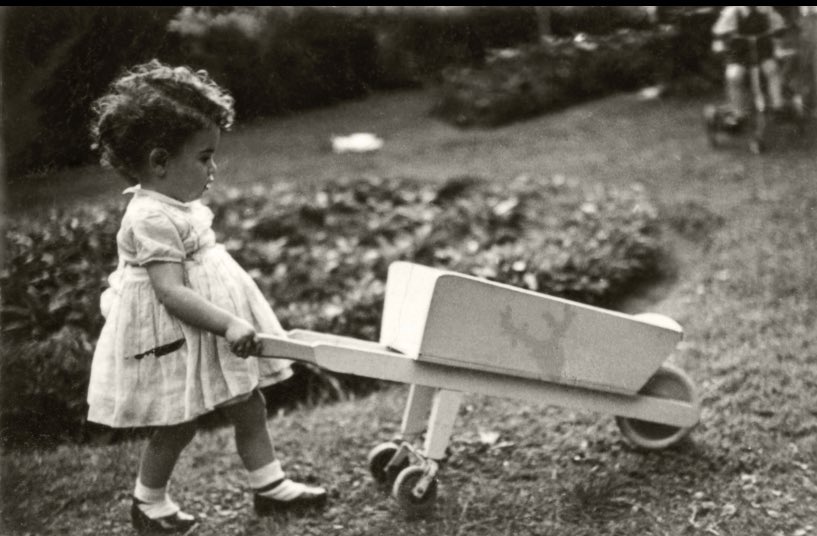

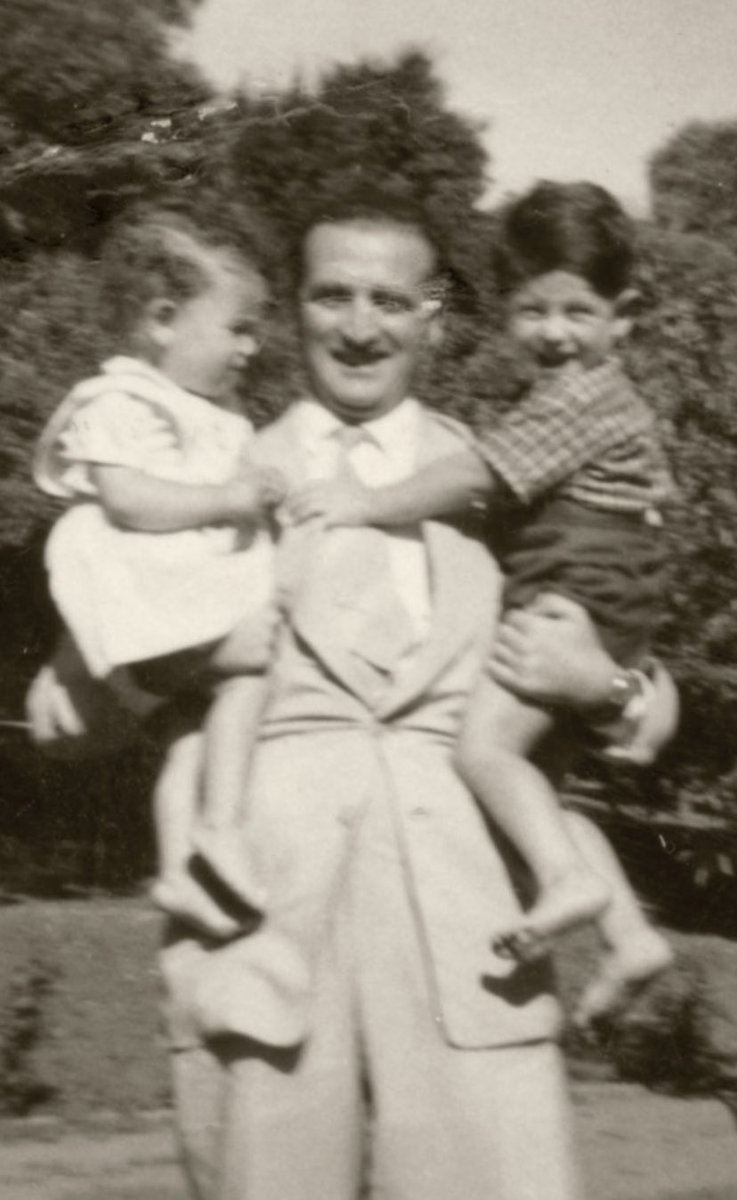
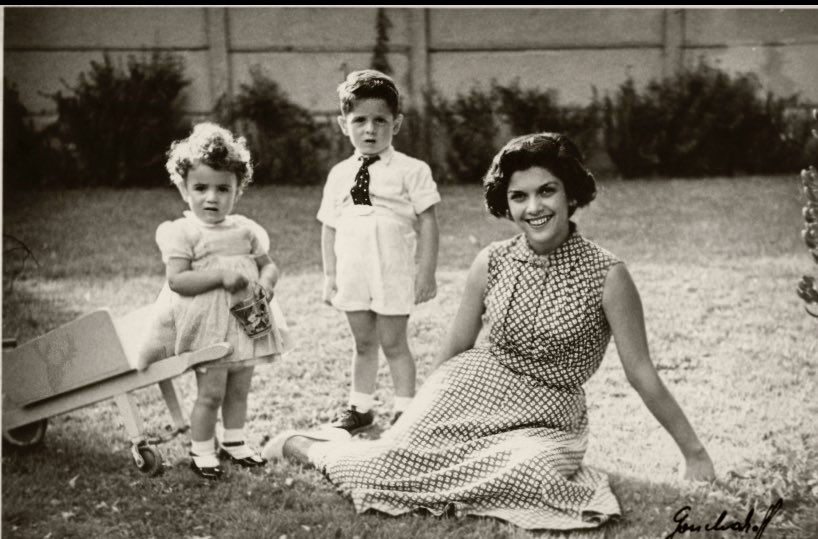


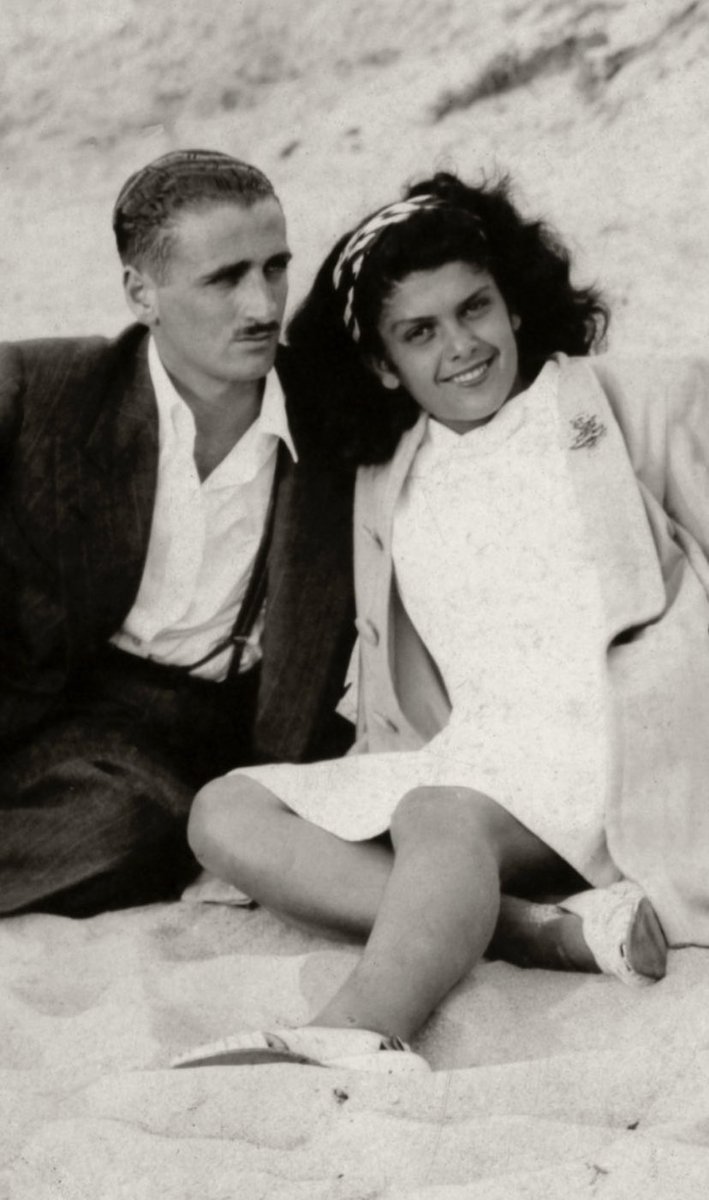

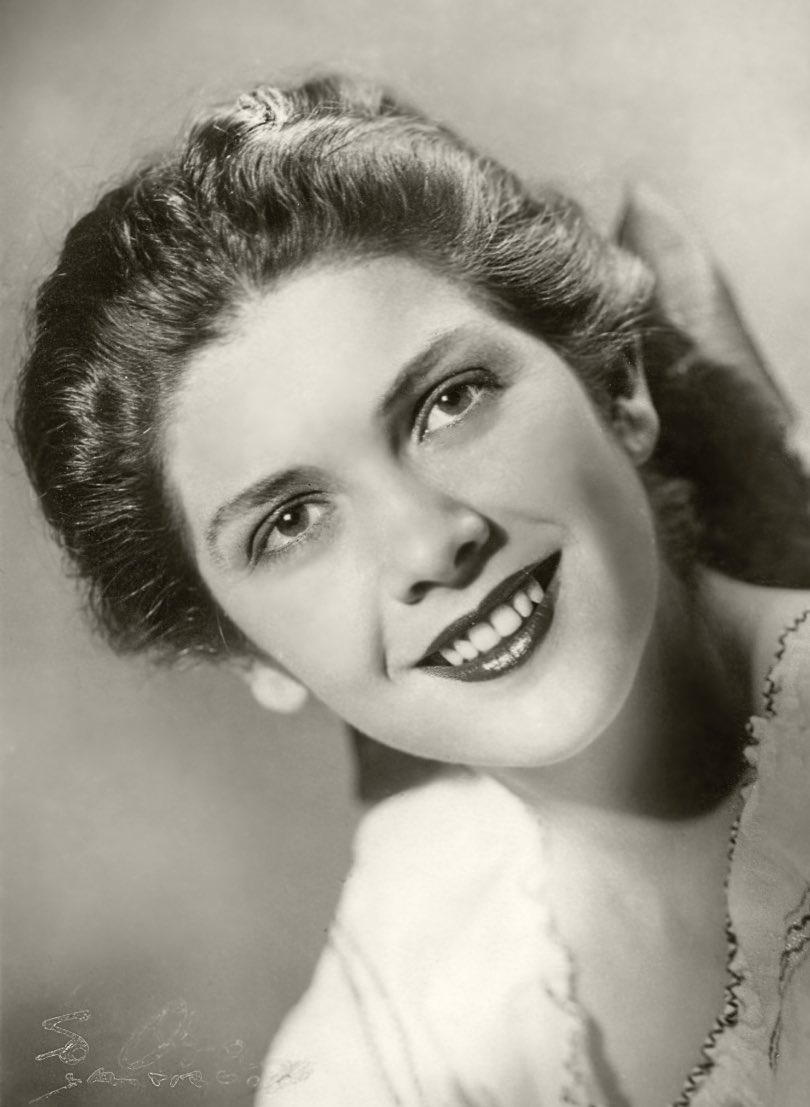
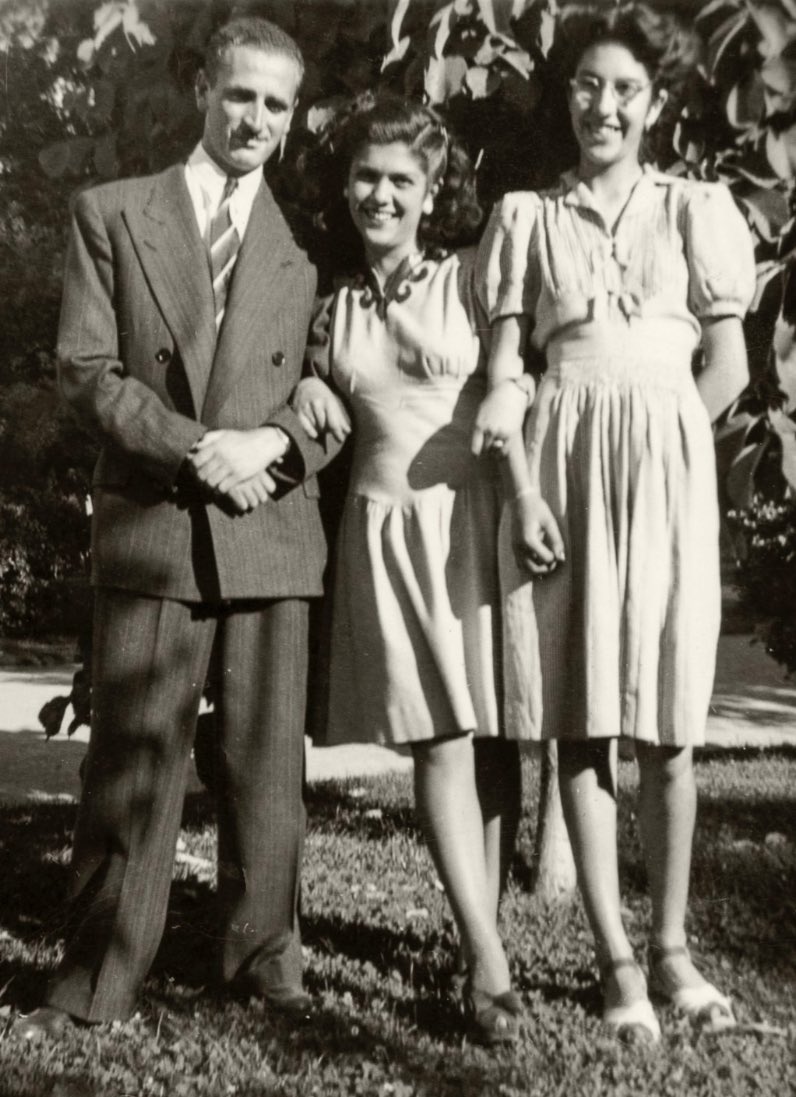
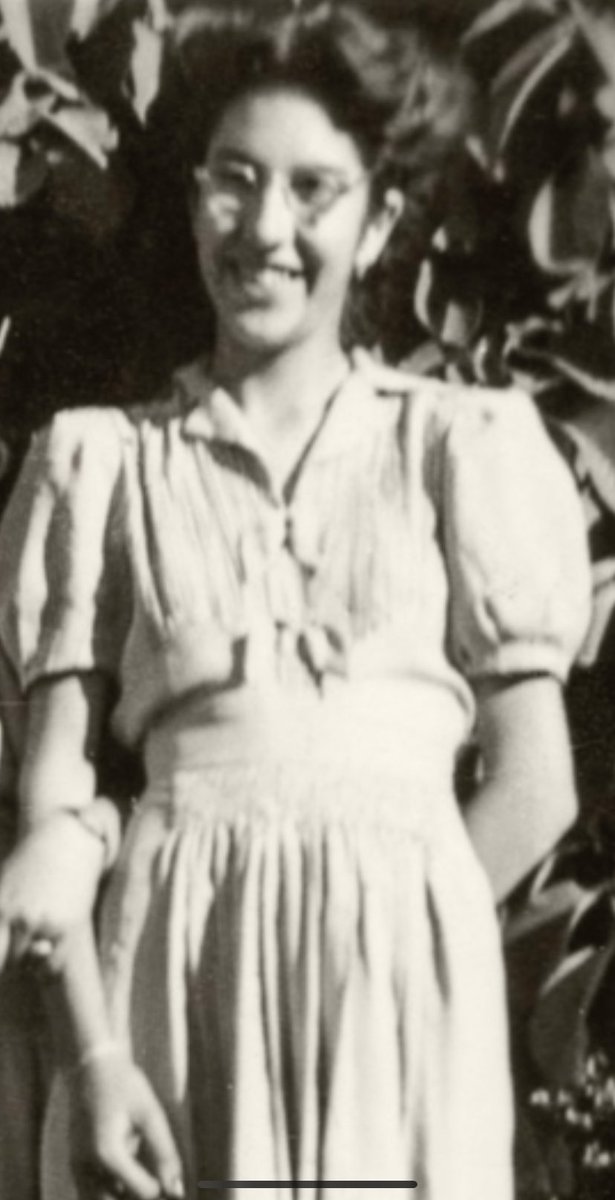
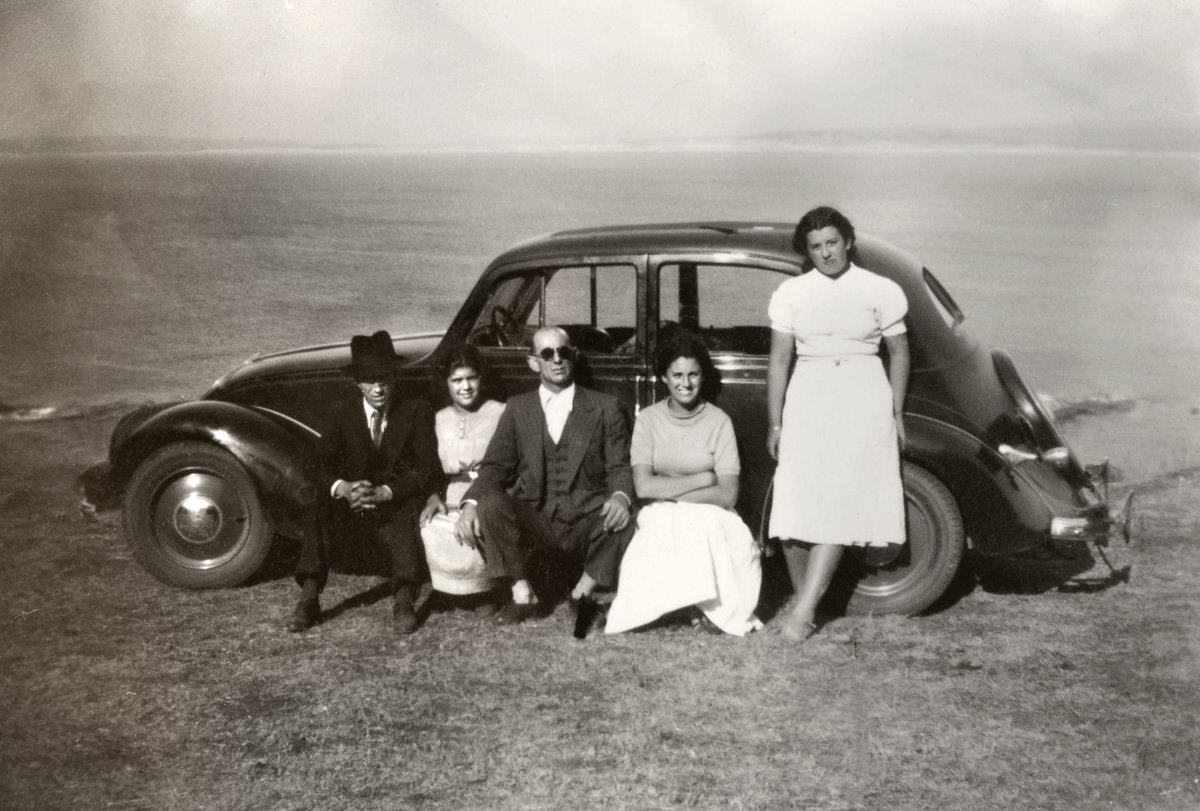
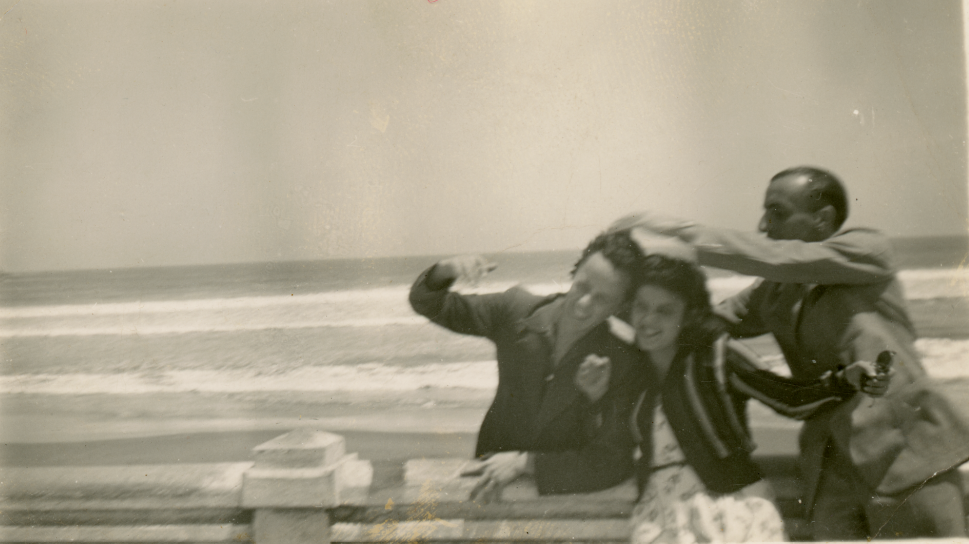
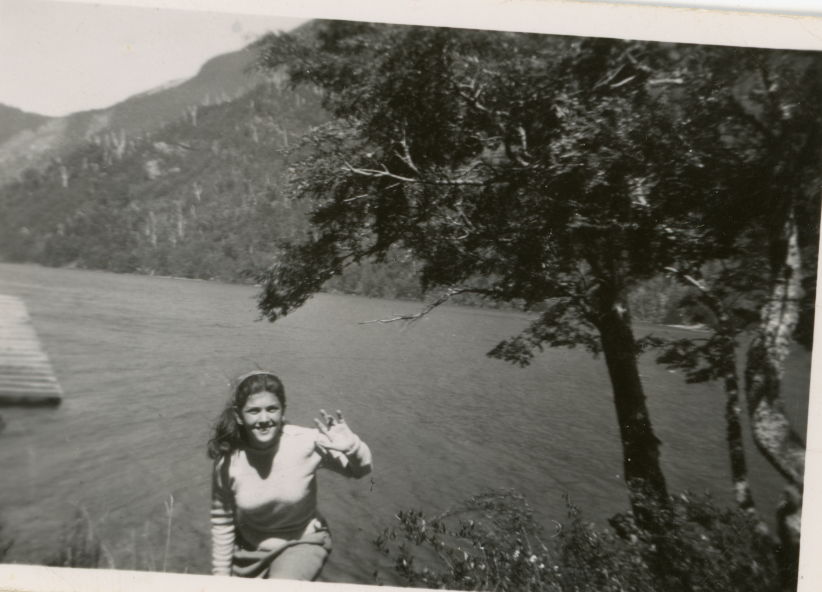
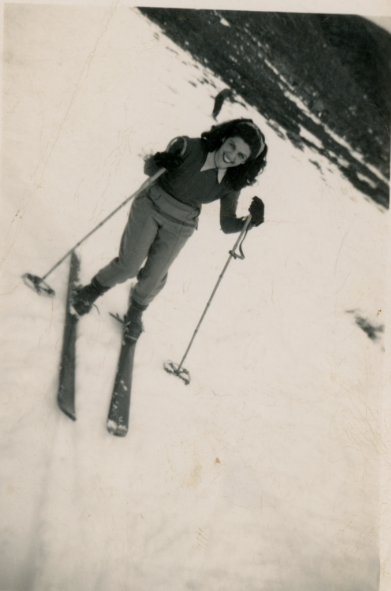
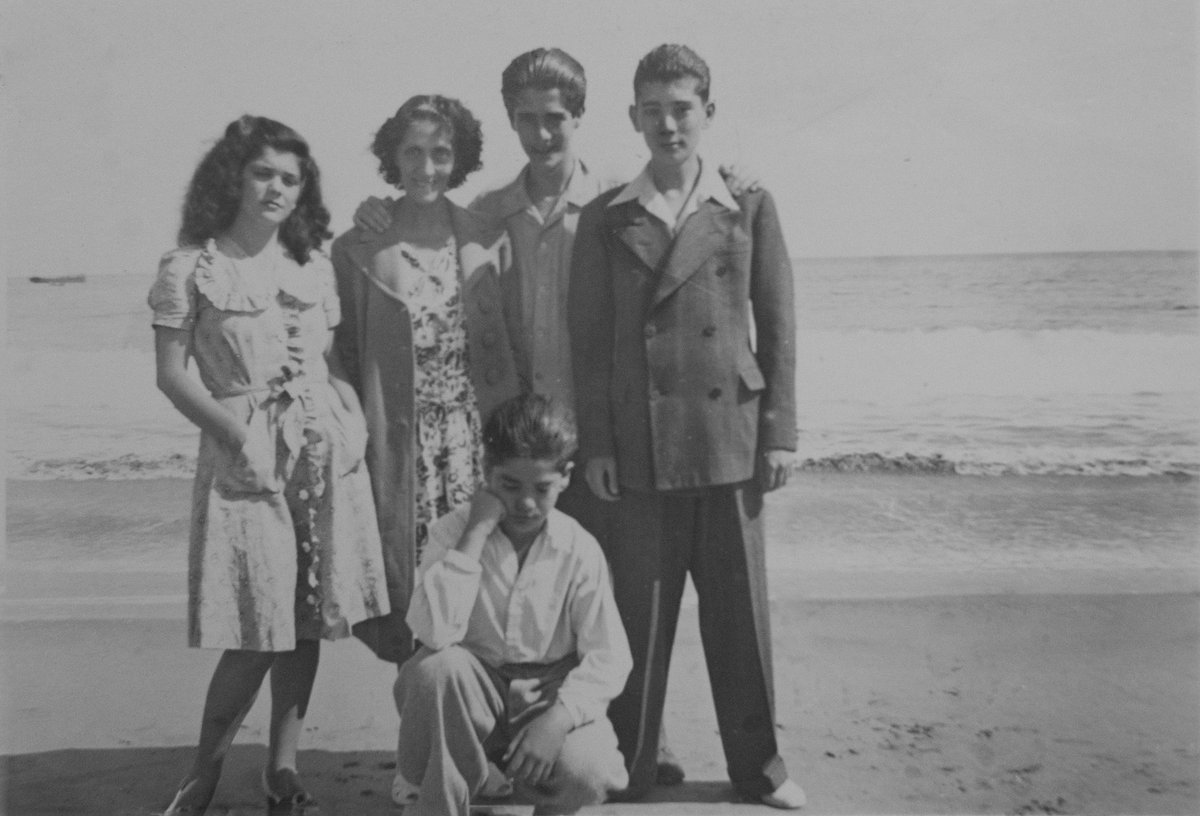

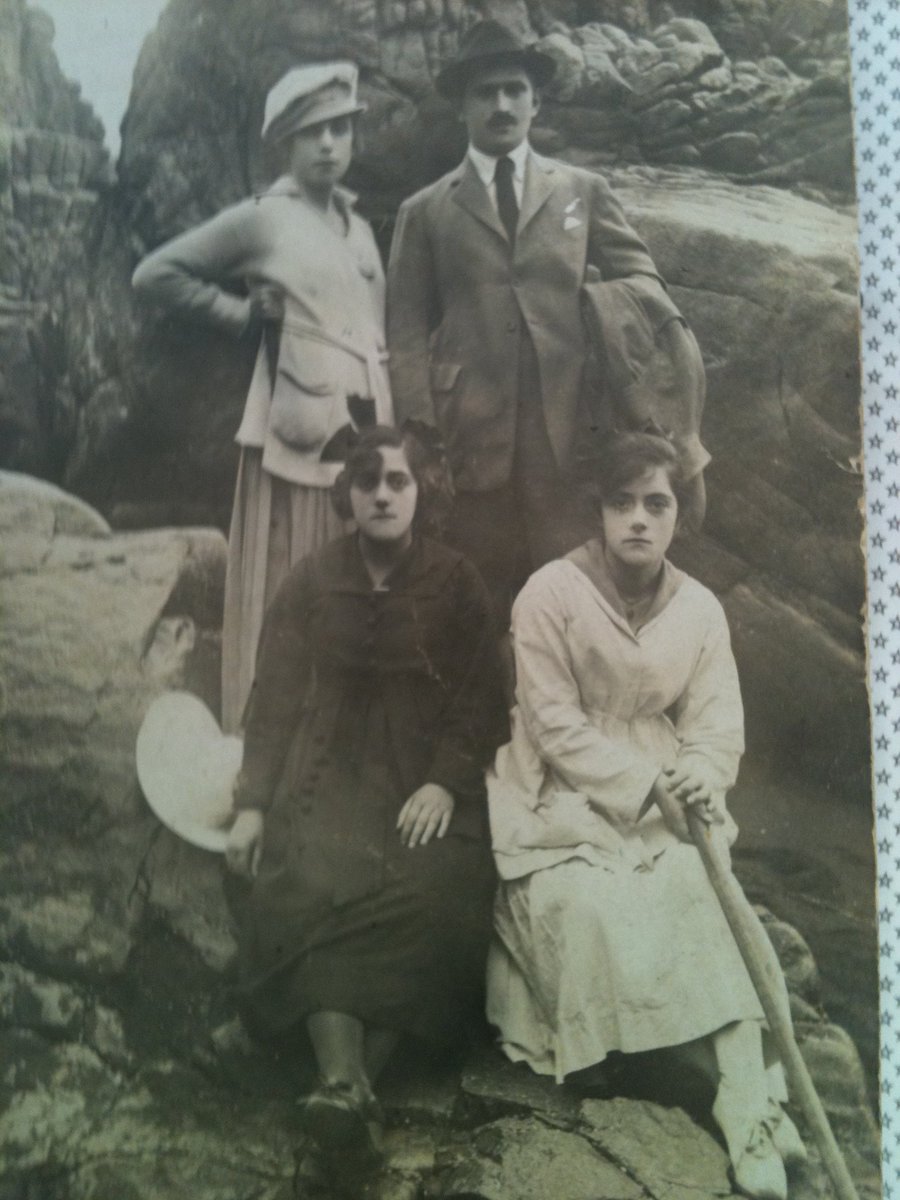

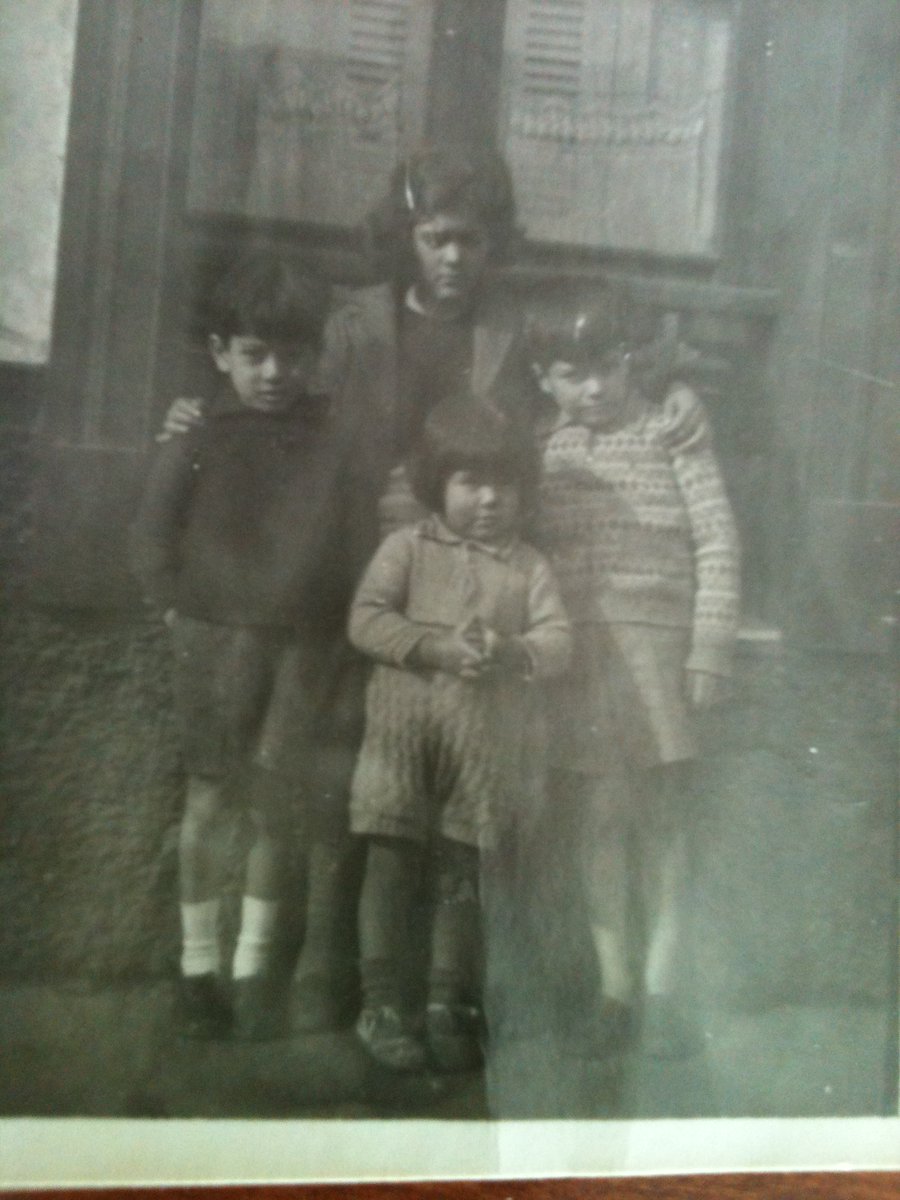
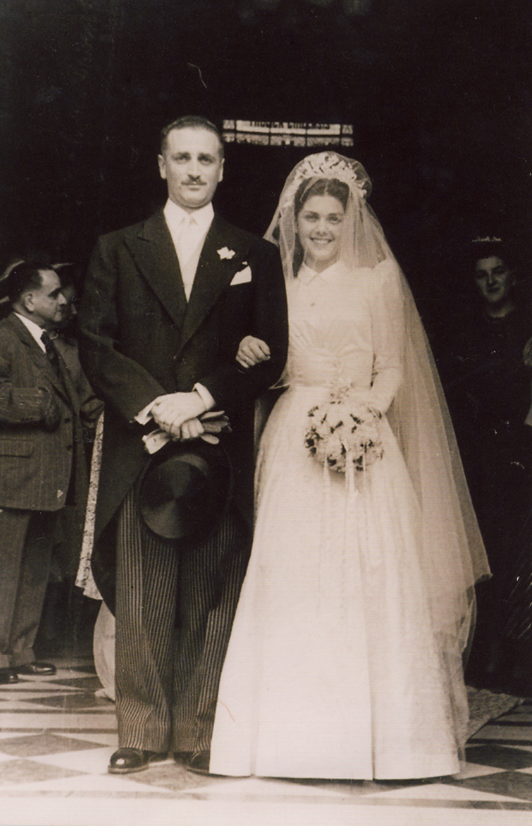

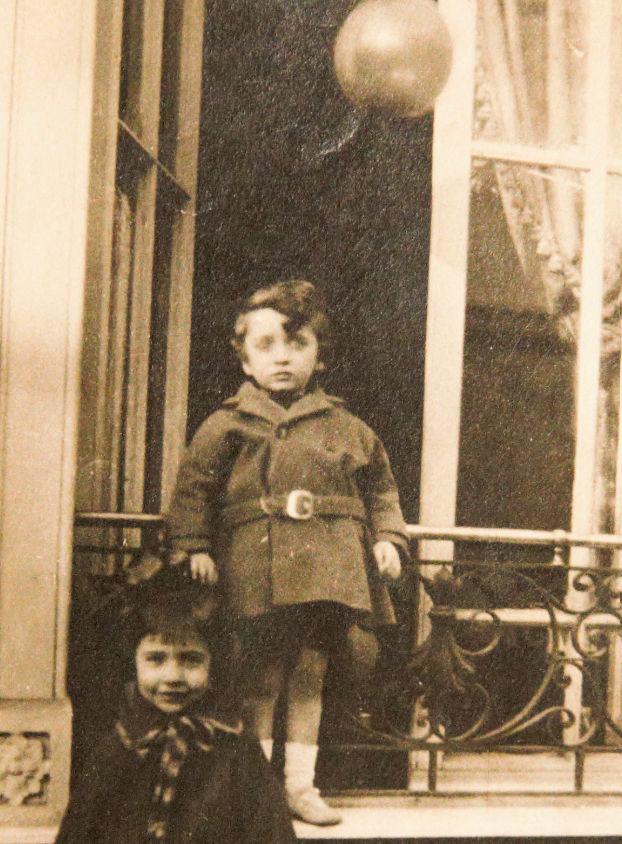

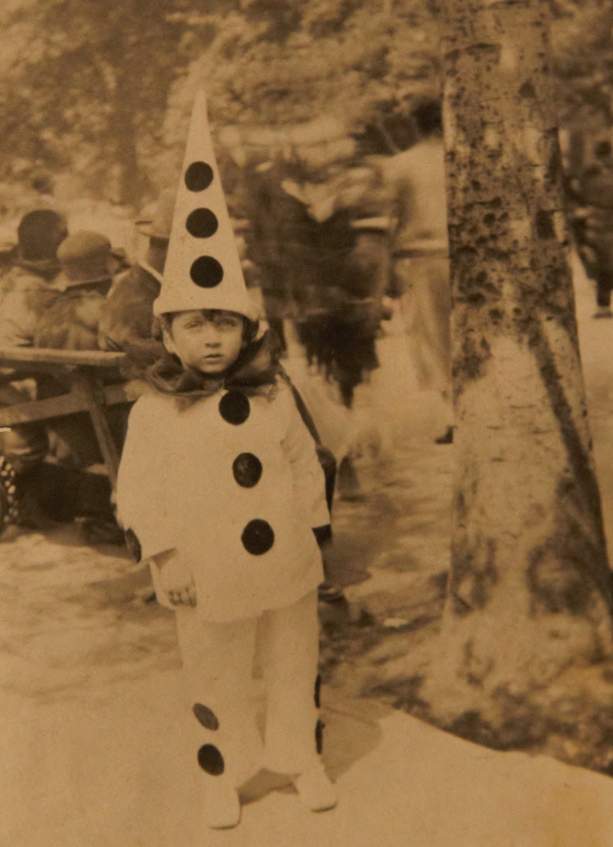
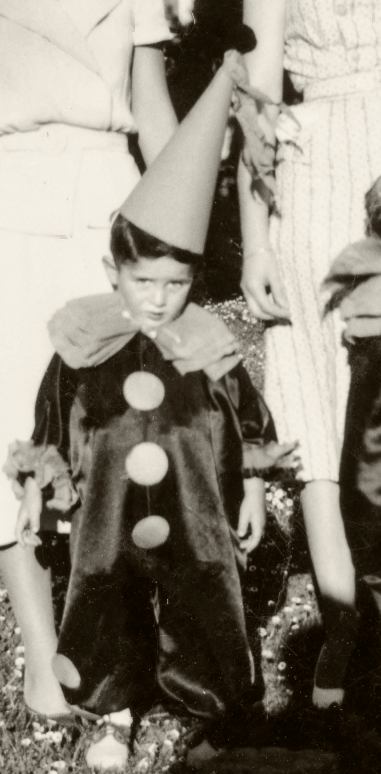
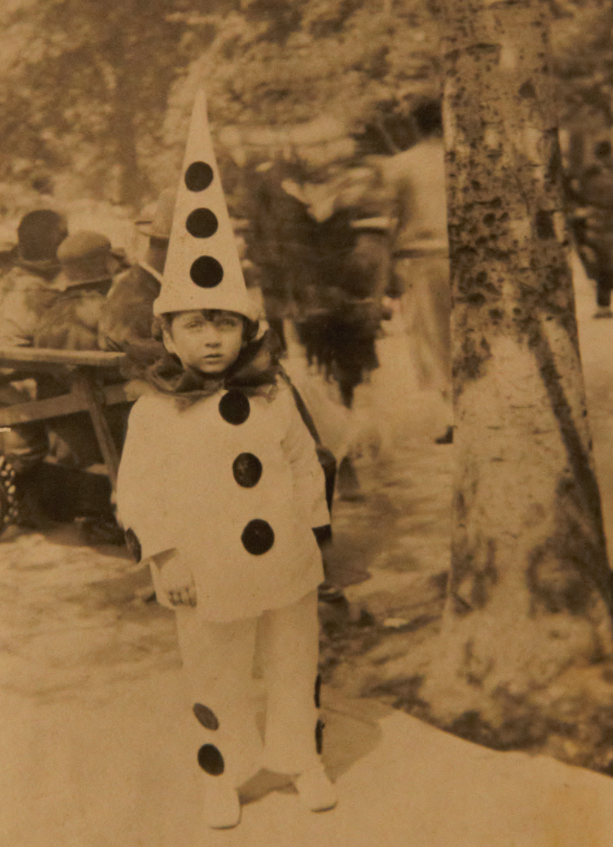
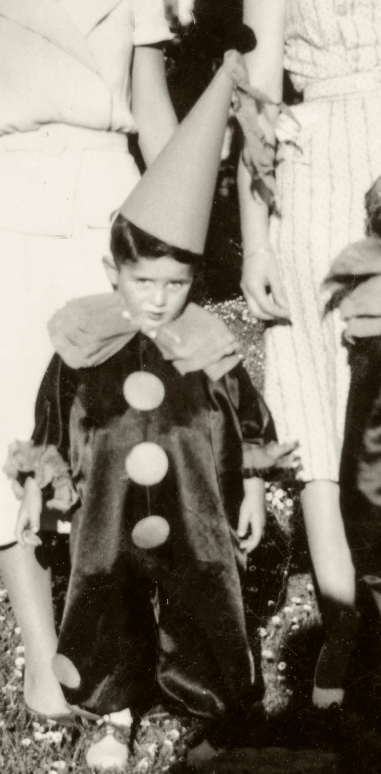
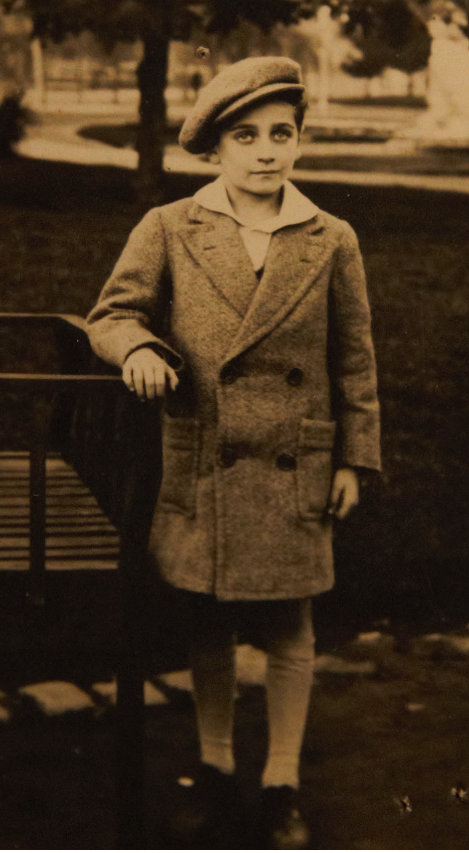
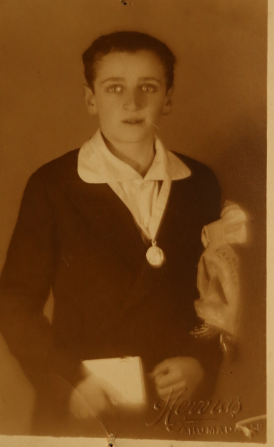


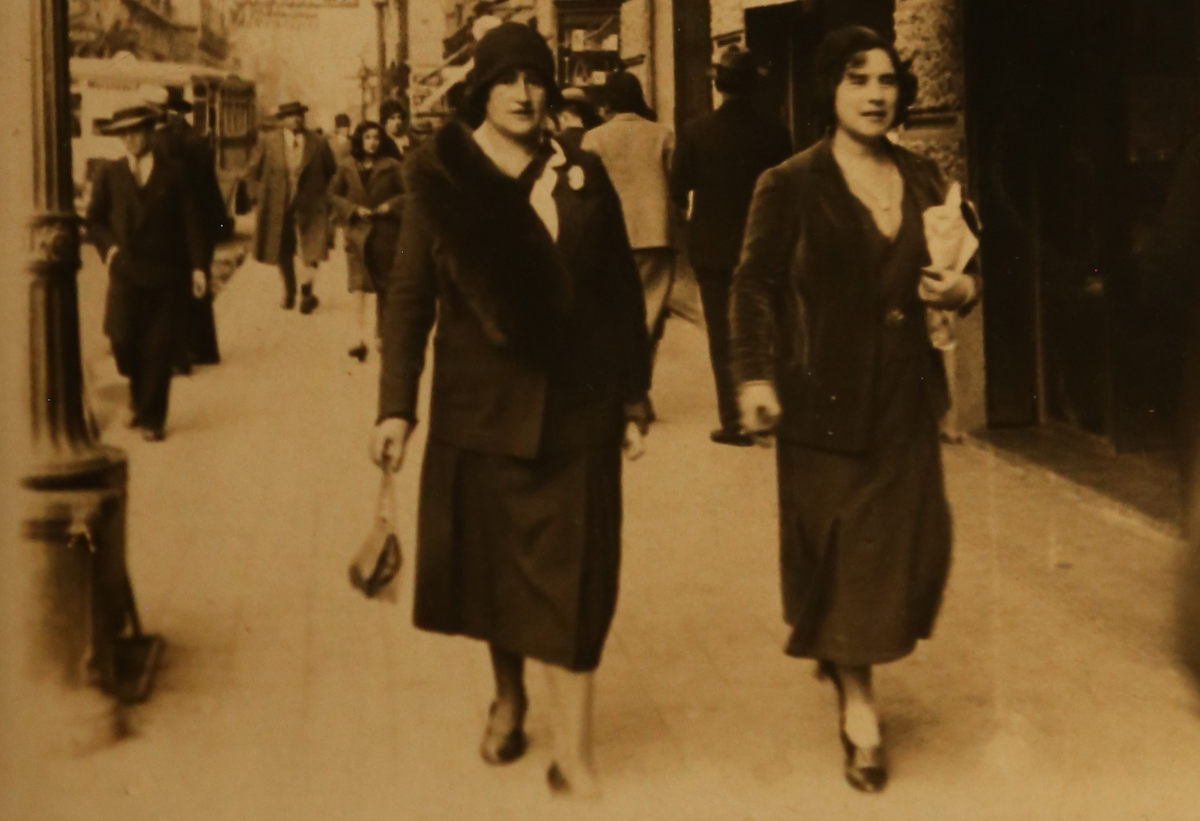

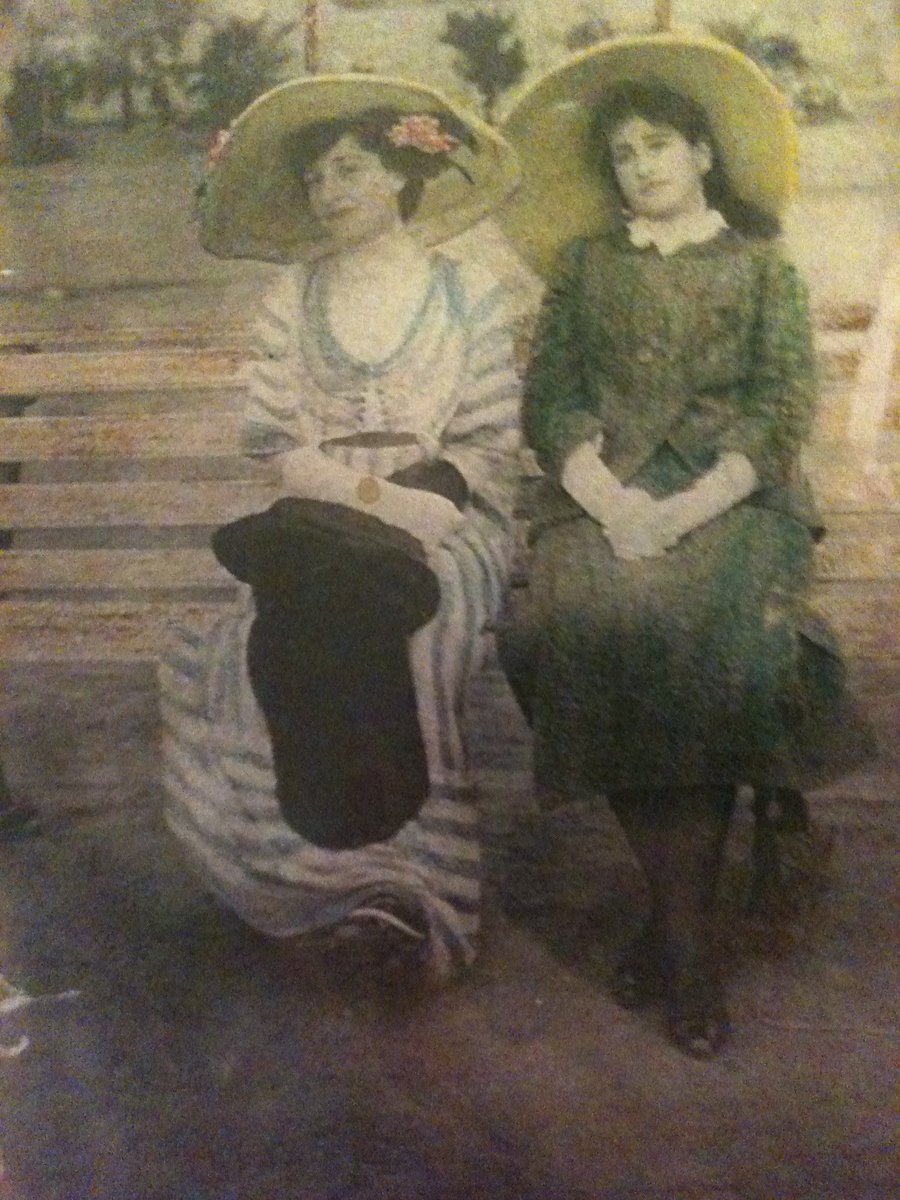

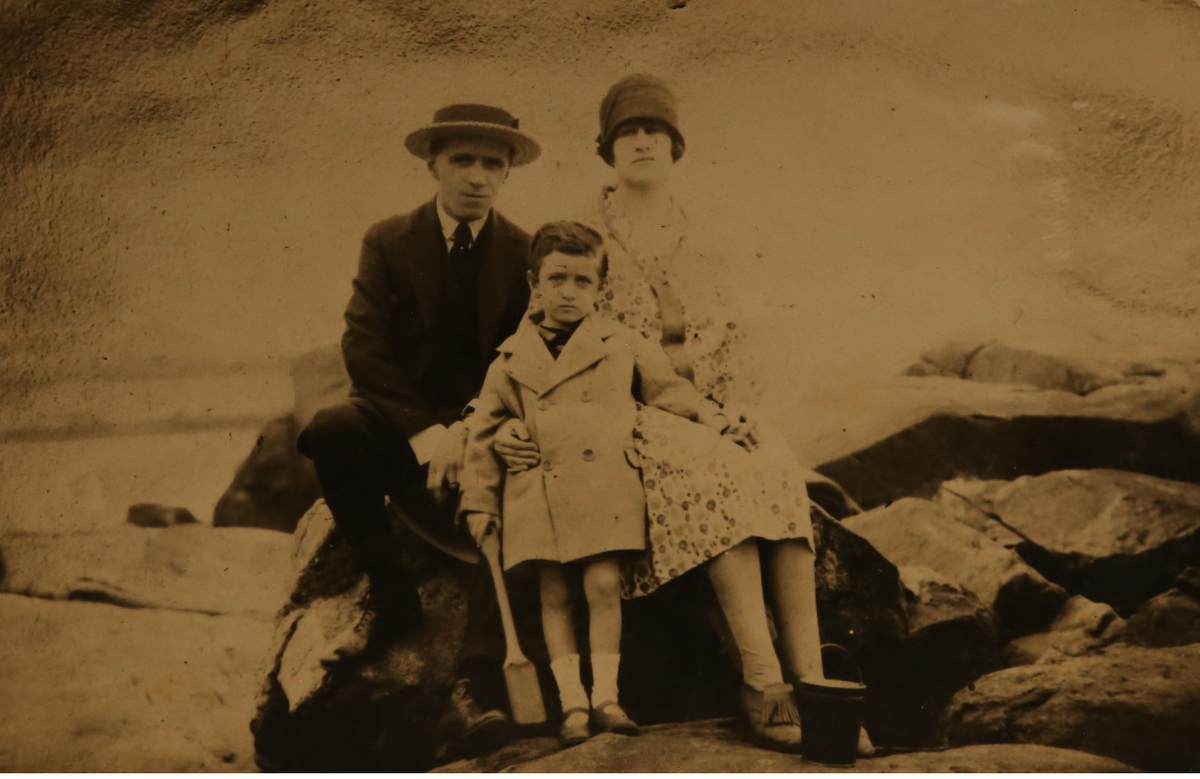

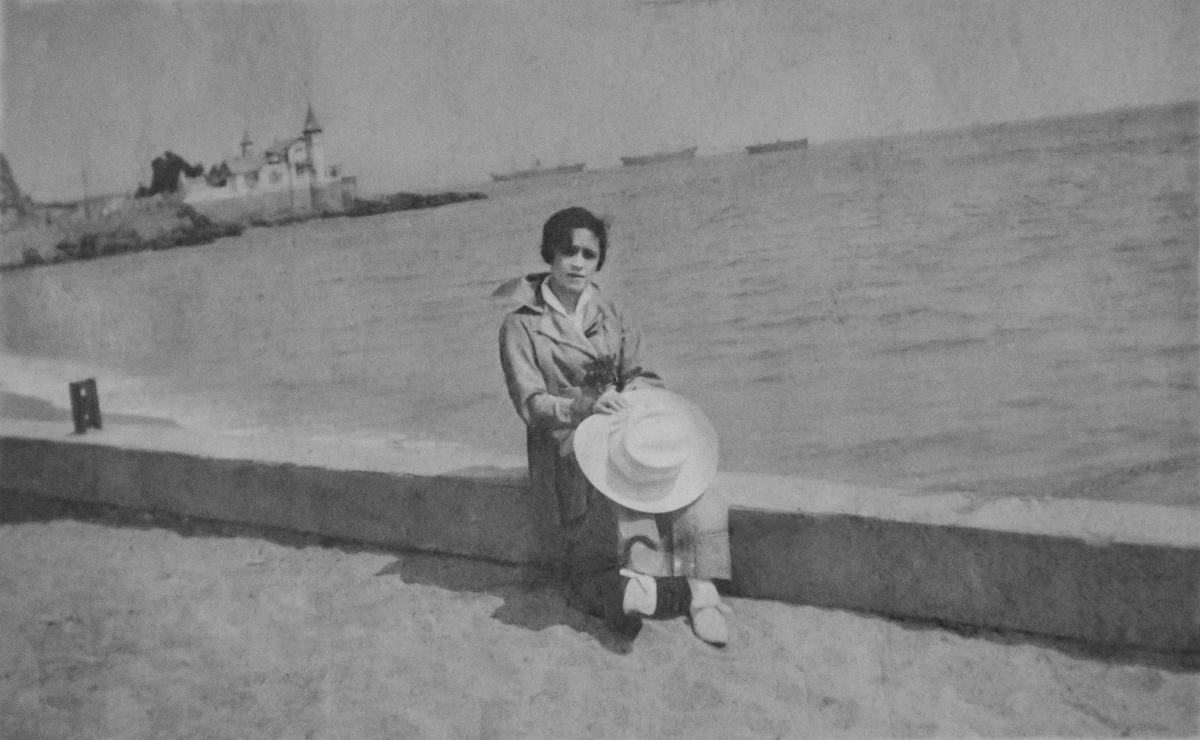




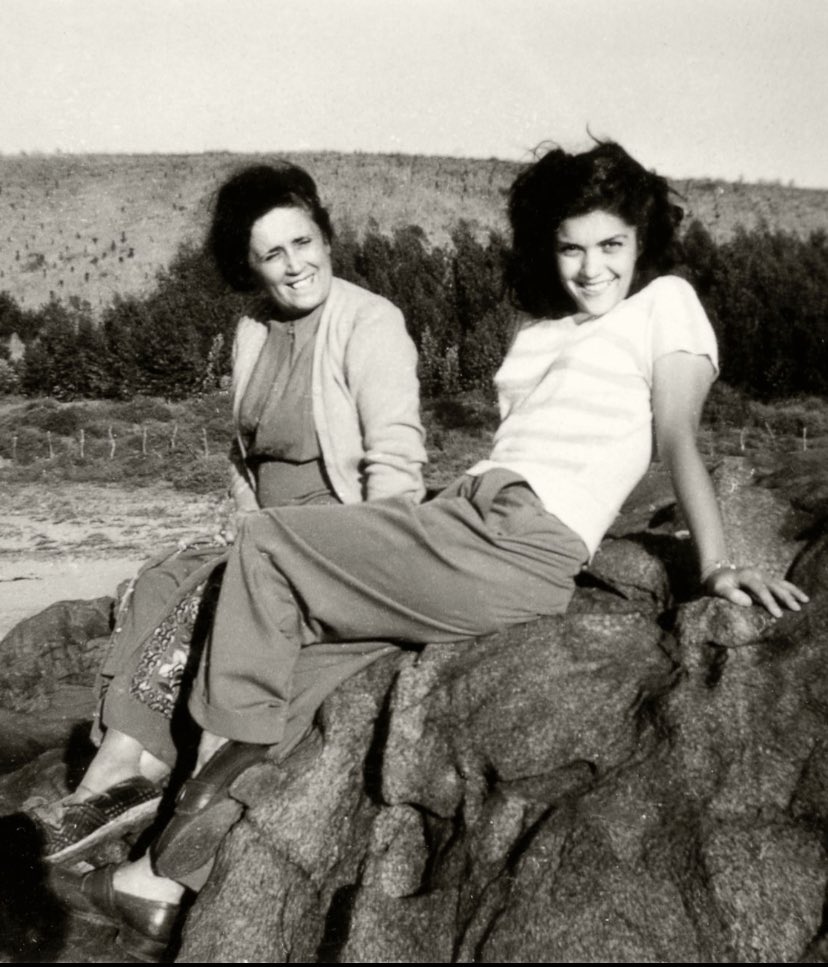
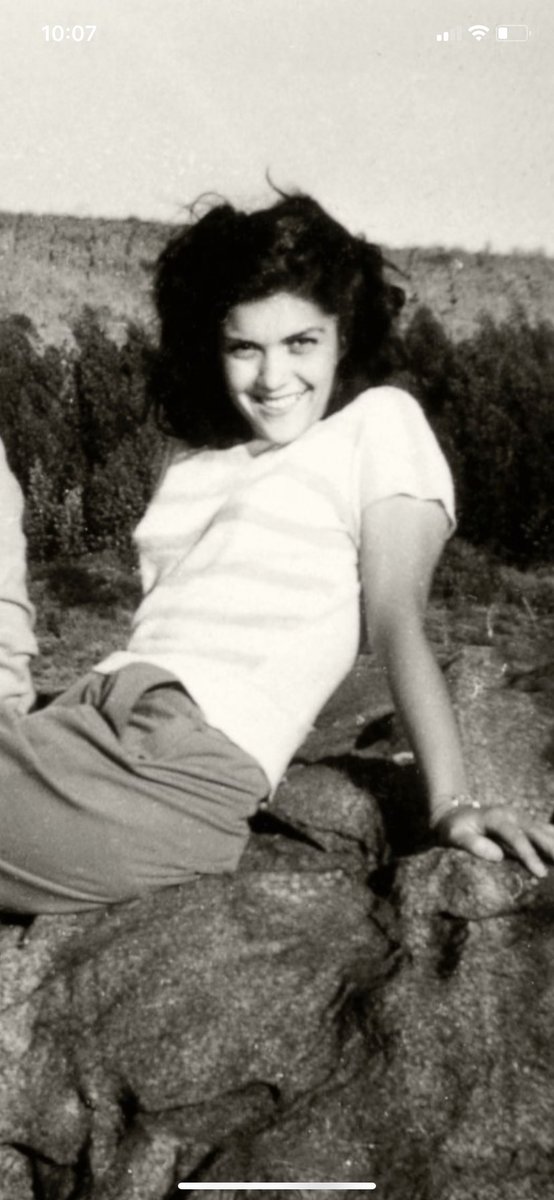



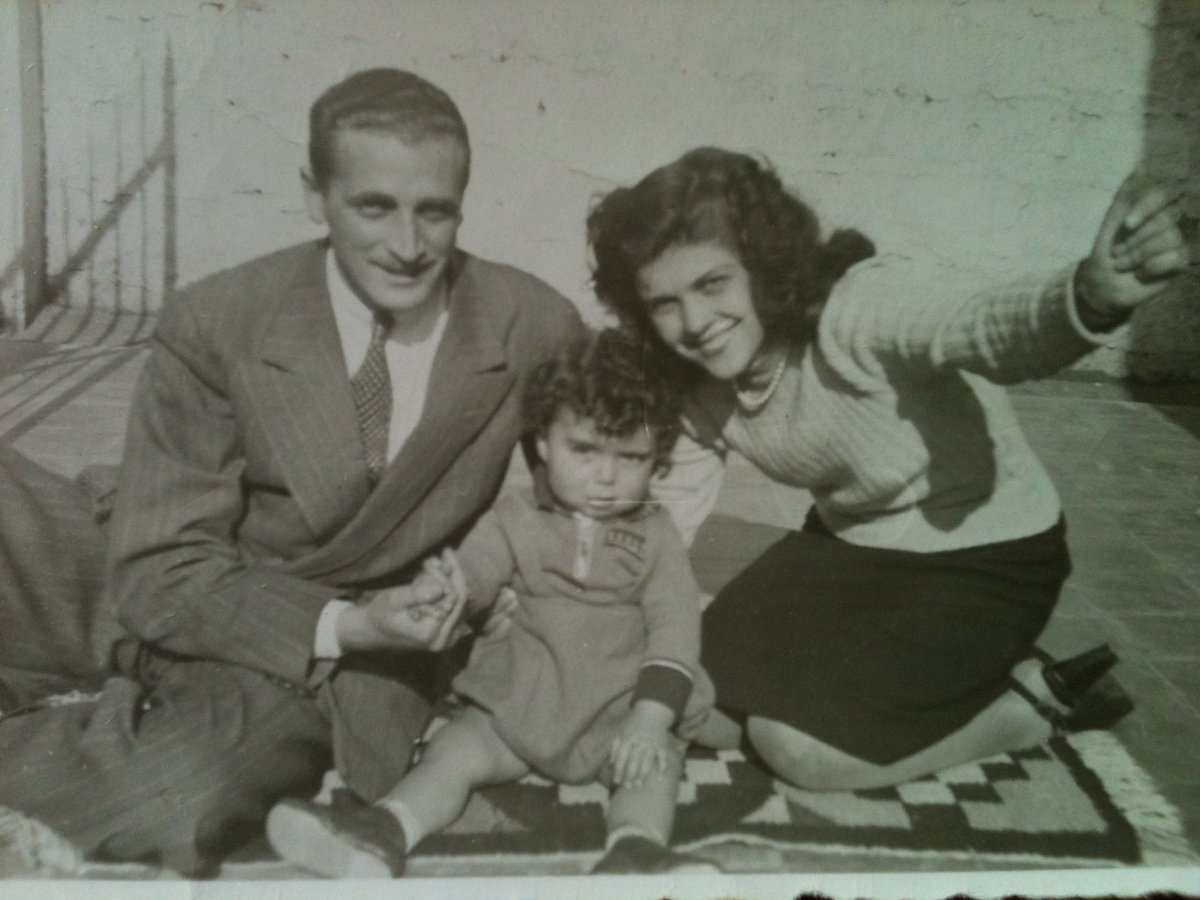
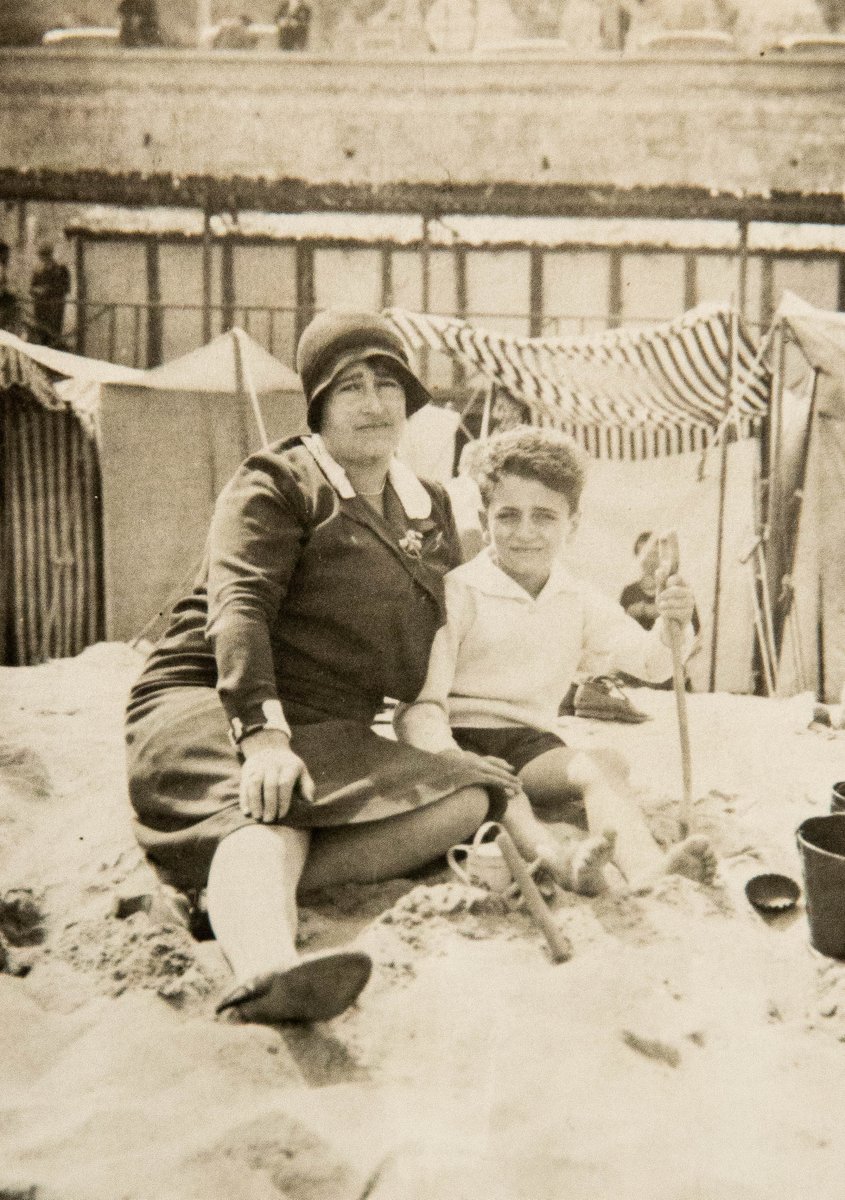
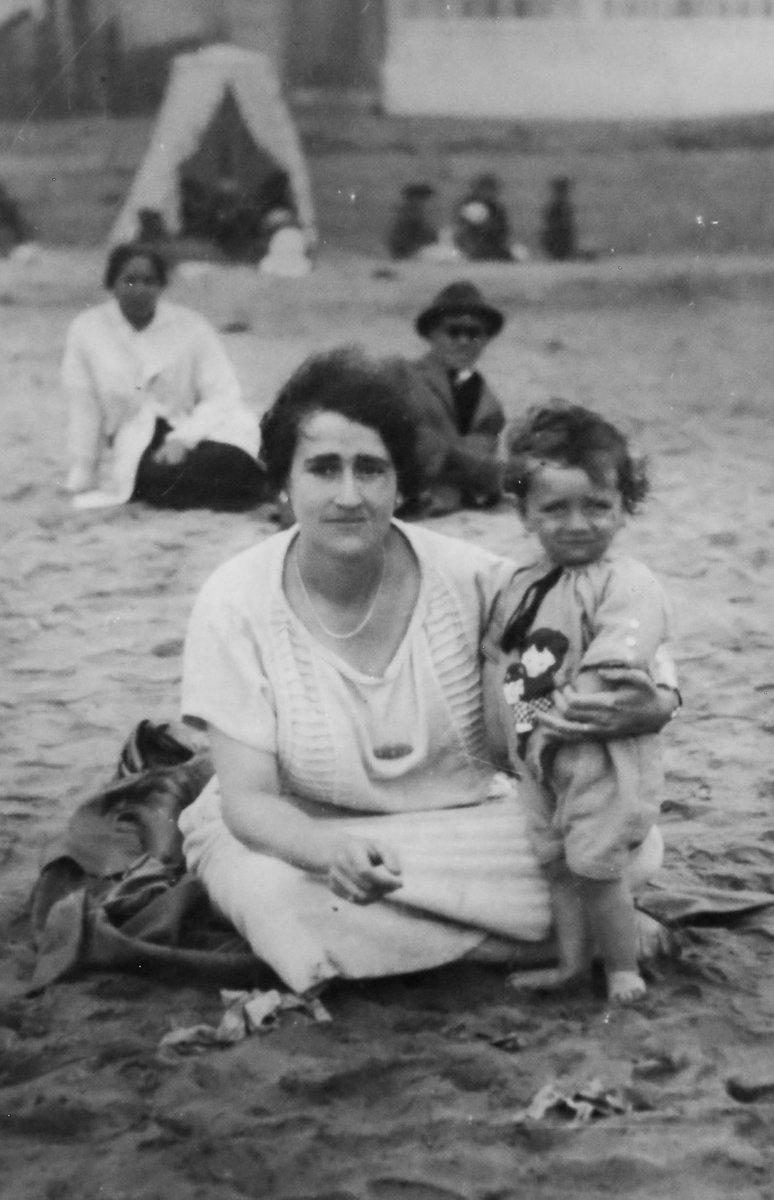
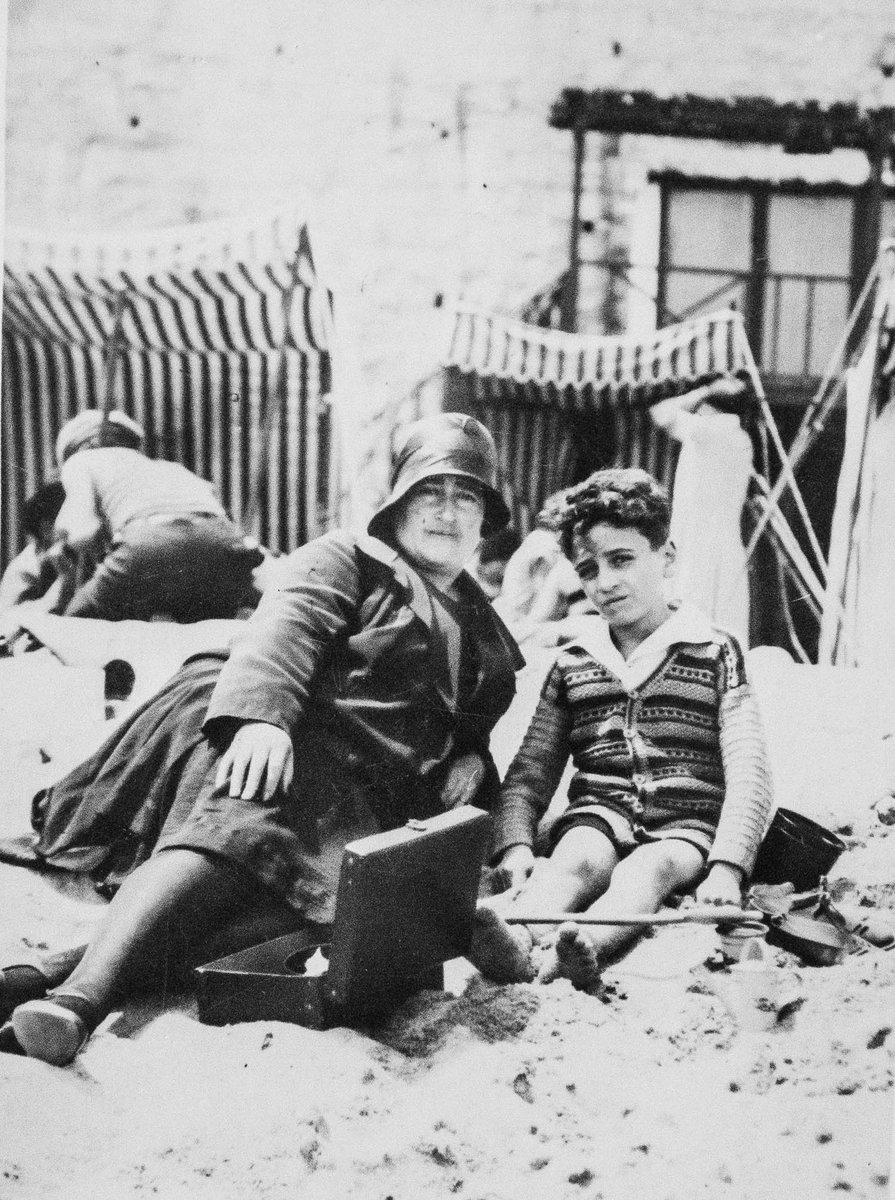


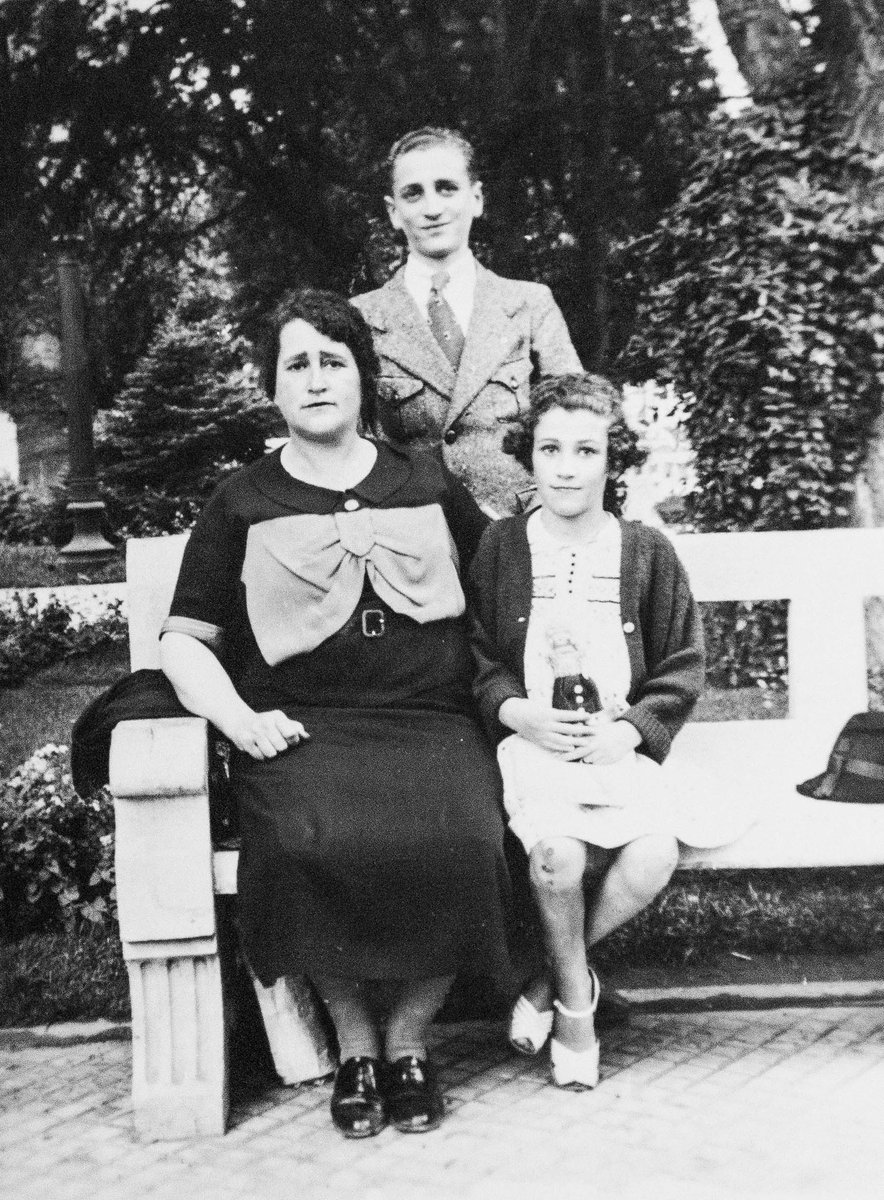
![She wrote them: "My beloved and remembered son: You can’t imagine the pleasure I took in your simple card; I see from it that happily, you arrived without news [difficulties]. I’m so glad you enjoyed the powdered cakes. Write to me soon. Your mother hugs you and kisses you." She wrote them: "My beloved and remembered son: You can’t imagine the pleasure I took in your simple card; I see from it that happily, you arrived without news [difficulties]. I’m so glad you enjoyed the powdered cakes. Write to me soon. Your mother hugs you and kisses you."](https://pbs.twimg.com/media/EeOrh-DUEAAth7z.jpg)

